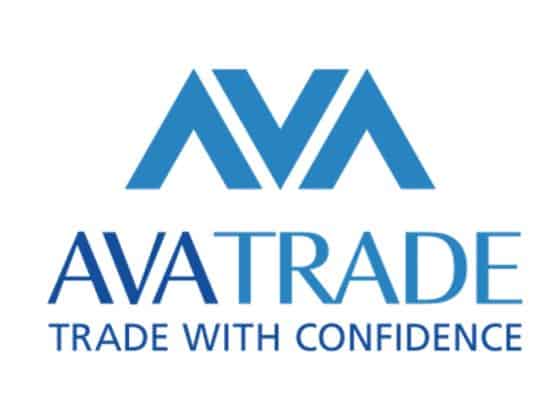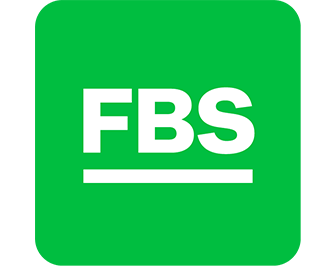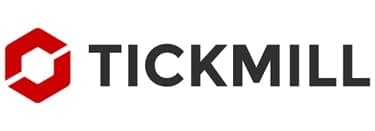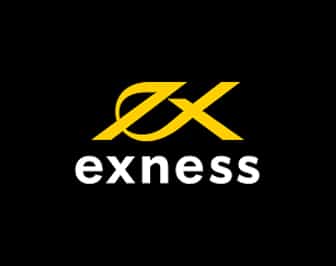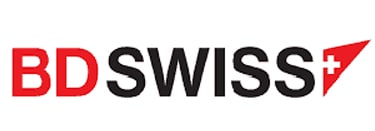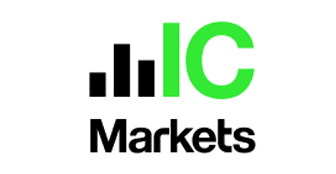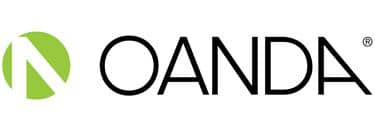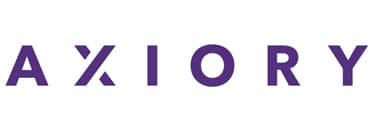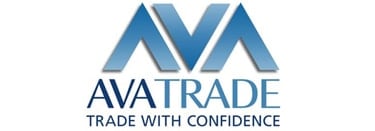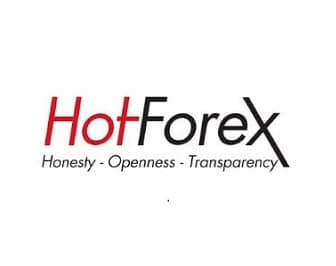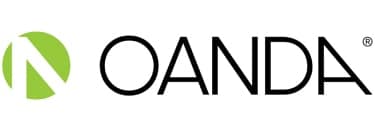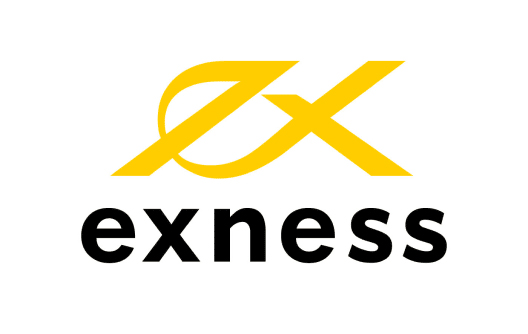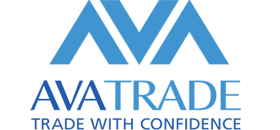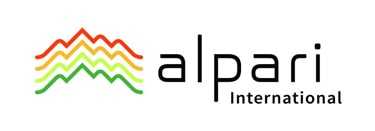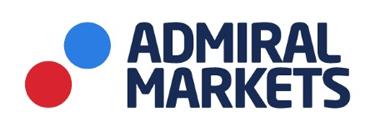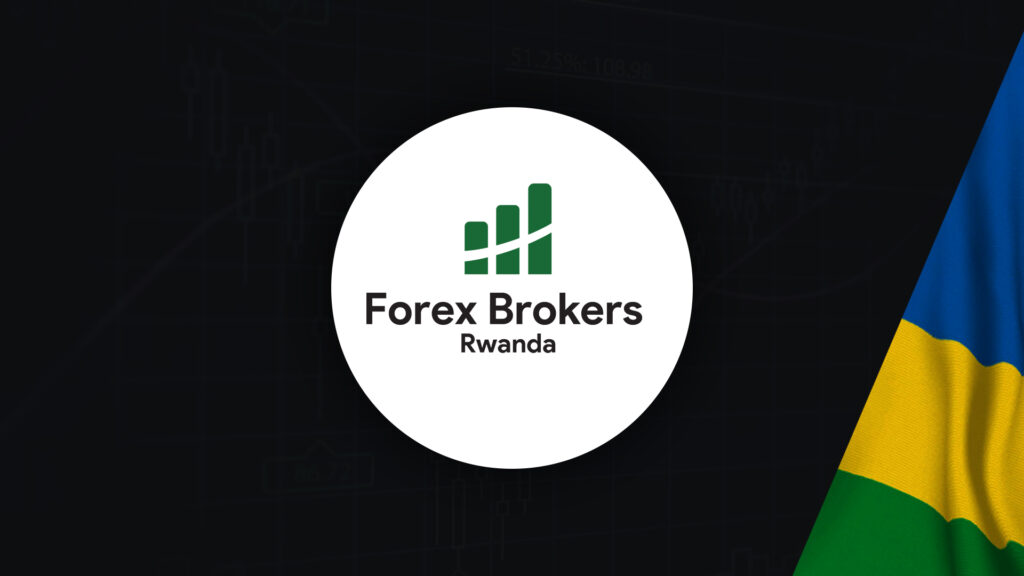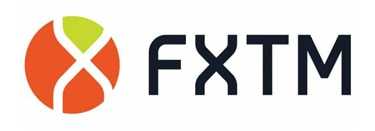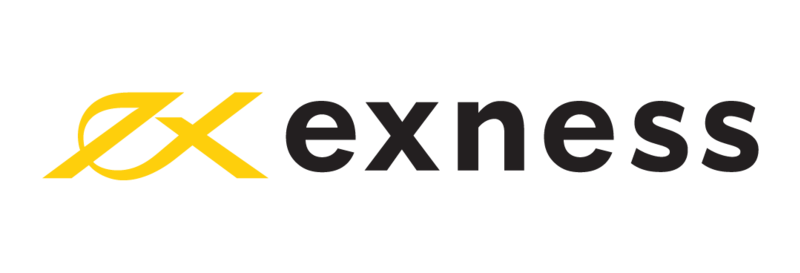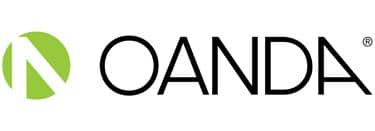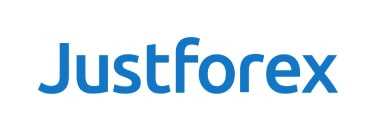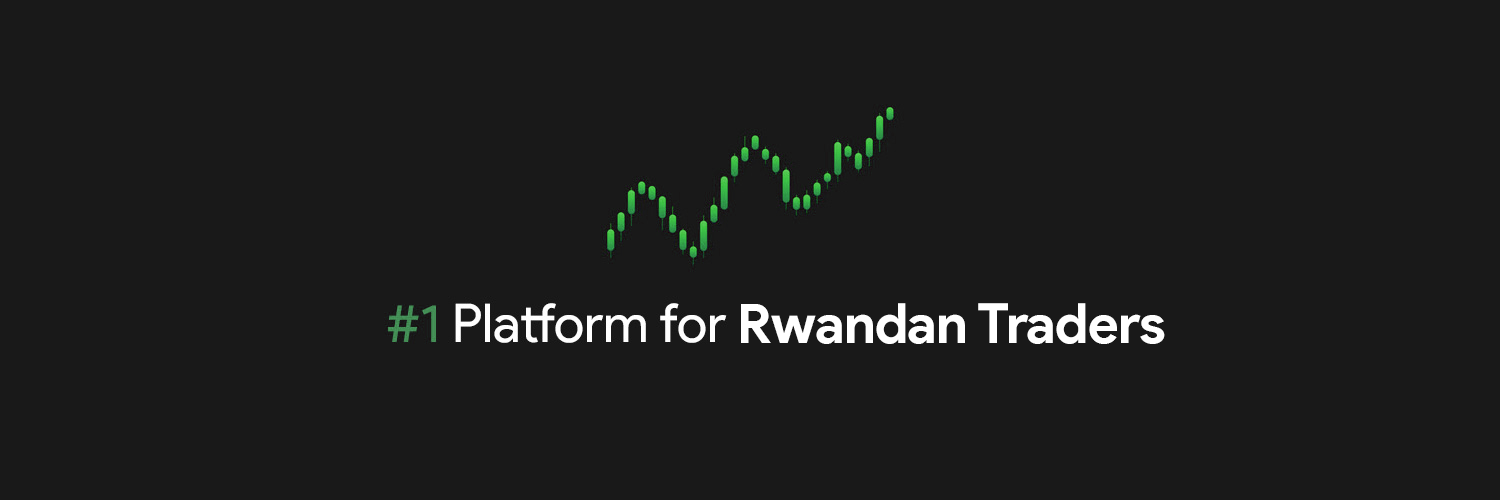
10 Best FSCA Regulated Forex Brokers in Rwanda
The 10 Best FSCA Regulated Forex Brokers operating in Rwanda were revealed. We tested and verified the best FSCA-Regulated in South Africa for Rwandan Traders.
This is a complete list of FSCA-Regulated forex brokers within Rwanda.
In this in-depth guide you’ll learn:
- What is the Financial Sector Conduct Authority (FSCA)?
- Why traders in Rwanda should sign up with an FSCA-regulated broker?
- Who are the best FSCA-regulated forex brokers for Rwandans in 2024?
- How to choose a forex broker – Compare them side by side, by, low minimum deposit, high leverage, best MetaTrader 5 platforms, low spreads, and much more.
- Which brokers on the list offers a 1st-time welcome sign-up bonus?
- Best FSCA-broker with MetaTrader 4 and MetaTrader 5 accounts?
And lots more…
So if you’re ready to go “all in” with the best-regulated FSCA forex brokers for Rwandans…
Let’s dive right in…
10 Best Forex Brokers in South Africa for 2024
Rank
Broker
Review
Regulators
Min Deposit
Official Site
- Louis Schoeman
Best FSCA Regulated Forex Brokers in Rwanda – Comparison
| 🥇 Broker | ✔️ FSCA Broker? | ⚖️ Regulation | 🏛 BNR Regulation? | 💸 RWF Deposits Allowed? | 👉 Open An Account |
| 1. Exness | Yes | FSA, CBCS, FSC, FSC BVI, FSCA, CySEC, FCA | No | Yes | 👉 Open Account |
| 2. AvaTrade | Yes | Central Bank of Ireland (CBI), BVI FSC, ASIC, FSCA, JFSA, FFAJ, ADGM, FRSA, CySEC, ISA | No | No | 👉 Open Account |
| 3. HFM | Yes | FSCA, CySEC, DFSA, FSA, FCA, FSC, CMA | No | Yes | 👉 Open Account |
| 4. Tickmill | Yes | ASIC, FMA, FSCA, FCA, CySEC, FSA, MAS | No | No | 👉 Open Account |
| 5. XM | Yes | FSCA, IFSC, ASIC, CySEC, DFSA | No | Yes | 👉 Open Account |
| 6. Alpari | Yes | Financial Services Commission Mauritius (FSC), FSCA | Yes | Yes | 👉 Open Account |
| 7. Pepperstone | Yes | ASIC, BaFin, CMA, CySEC, DFSA, FCA and SCB | No | Yes | 👉 Open Account |
| 8. Trade Nation | Yes | FCA, ASIC, FSCA, SCB | No | No | 👉 Open Account |
| 9. FXTM | Yes | CySEC, FSCA, FCA, FSC Mauritius | No | Yes | 👉 Open Account |
| 10. FxPro | Yes | FCA, CySEC, FSCA, DFSA, SCB | No | No | 👉 Open Account |
What is an FSCA-Regulated broker?
The FSCA is the market conduct regulator of financial institutions, that provide financial products and financial services, financial institutions that are licensed in terms of a financial sector law.
10 Best FSCA Regulated Forex Brokers in Rwanda (2024)
1. Exness
Min Deposit
USD 10
Regulators
CBCS, CySEC, FCA, FSA, FSC, FSCA, CMA
Trading Desk
MetaTrader 4 and MetaTrader 5
Crypto
Yes
Total Pairs
107
Islamic Account
Yes
Trading Fees
Low
Account Activation Time
24 Hours
Overview
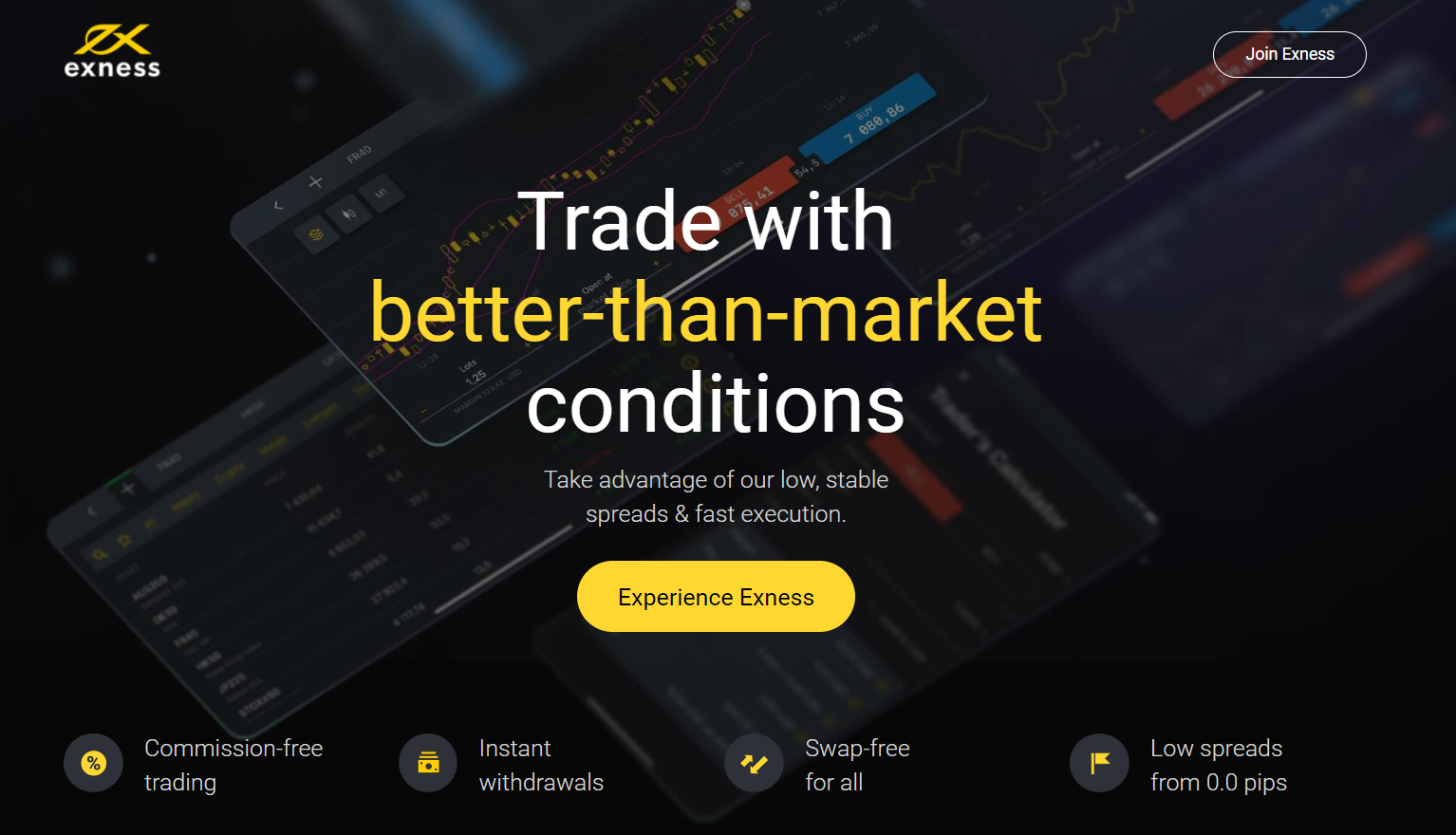
Exness, equipped with the necessary licenses and authorization, offers a comprehensive range of trading solutions and services to traders in Rwanda.
Traders in Rwanda have the flexibility to select from a variety of account types at Exness, and the company provides specialized customer service throughout the week.
Exness is known for having some of the tightest spreads and lowest commissions in the industry, ensuring a secure, fair, and transparent trading environment for its users.
Unique Features
| Feature | Information |
| ⚖️ Regulation | FSA, CBCS, FSC, FSC BVI, FSCA, CySEC, FCA |
| 📲 Social Media Platforms | • Facebook • YouTube |
| 🏛 BNR Regulation? | No |
| 💻 Trading Accounts | Standard Account, Standard Cent Account, Raw Spread Account, Zero Account, Pro Account |
| 📱 Trading Platform | MetaTrader 4, MetaTrader 5, Exness Terminal, Exness Trader app |
| 💸 Minimum Deposit (RWF) | 61,837 |
| 💵 Trading Assets | Forex, Metals, Crypto, Energies, Indices, Stocks |
| 💰 Rwandan Franc-based Account? | Yes |
| 💳 RWF Deposits Allowed? | Yes |
| 💸 Bonuses for Rwandan traders? | Yes |
| 📊 Minimum spread | From 0.0 pips EUR/USD |
| 💻 Demo Account | Yes |
| ☪️ Islamic Account | Yes |
| ✔️ Pros | ❌ Cons |
| Exness is well-regulated and keeps all client funds in segregated accounts with top-tier institutions | There is a limited portfolio of financial instruments offered |
| Rwandan traders can choose between several retail investor accounts | Exness offers a limited number of payment methods that can be used for deposits and withdrawals |
| Exness offers an Islamic account conversion with no additional fees charged | |
| Instant deposits and withdrawals are offered | |
| Exness has customer support available 24 hours a day, 7 days a week |
2. AvaTrade
Min Deposit
USD 100
Regulators
ASIC, FSA
Trading Desk
MetaTrader 4, MetaTrader 5, Ava Social, Ava Protect, Trading Central
Crypto
Yes
Total Pairs
55+
Islamic Account
Yes
Trading Fees
Low
Account Activation Time
24 Hours
Overview
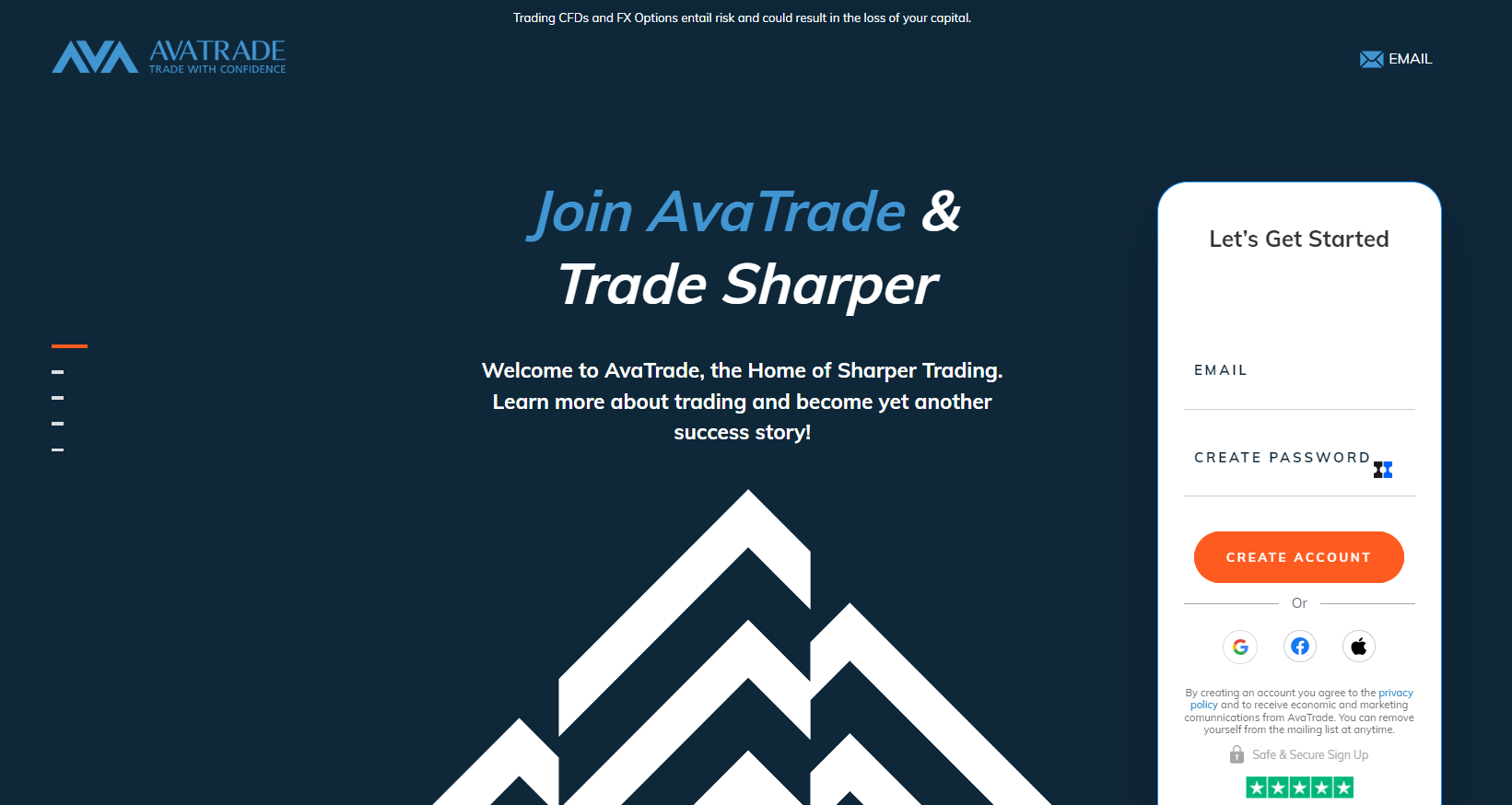
AvaTrade, one of the largest and most popular CFD and forex brokers in Rwanda, offers an extensive selection of over 1,250 tradable financial products spanning various asset classes.
Despite having only two account types, AvaTrade’s accounts boast versatile and dynamic features that cater to both novice and experienced traders in Rwanda.
Unique Features
| Feature | Information |
| ⚖️ Regulation | Central Bank of Ireland (CBI), BVI FSC, ASIC, FSCA, JFSA, FFAJ, ADGM, FRSA, CySEC, ISA |
| 📲 Social Media Platforms | • Instagram • YouTube |
| 🏛 BNR Regulation? | No |
| 💻 Trading Accounts | Retail Account, Professional Account |
| 📱 Trading Platform | AvaTradeGO, AvaOptions, AvaSocial, MetaTrader 4, MetaTrader 5, DupliTrade, ZuluTrade |
| 💸 Minimum Deposit (RWF) | 62,591 |
| 💵 Trading Assets | Forex, Cryptocurrencies, Commodities, Treasuries, Bonds, Indices, Stocks, ETFs, Options, CFDs, Precious Metals |
| 💰 Rwandan Franc-based Account? | No |
| 💳 RWF Deposits Allowed? | No |
| 💸 Bonuses for Rwandan traders? | Yes |
| 📊 Minimum spread | From 0.9 pips EUR/USD |
| 💻 Demo Account | Yes |
| ☪️ Islamic Account | Yes |
| ✔️ Pros | ❌ Cons |
| AvaTrade caters specifically to the unique needs of Muslim traders | There are no variable spreads offered |
| There is a dedicated selection of financial markets that Muslim traders can trade | There are inactivity fees applied as well as currency conversion fees |
| There is a demo account that can be used to test strategies, and practice trading | |
| There are no additional charges on the Islamic Account | |
| Professional traders can employ advanced technical indicators and access powerful research tools and resources | |
| There is a large range of financial instruments offered |
3. HFM
Min Deposit
USD 5
Regulators
CySEC, FSC, CFTC
Trading Desk
MetaTrader 4 and MetaTrader 5
Crypto
No
Total Pairs
47
Islamic Account
Yes
Trading Fees
Low
Account Activation Time
24 Hours
Overview
👉 HFM was founded in 2010 and is a well-regulated and internationally recognized brokerage firm. With HFM, traders in Nigeria have access to hundreds of worldwide financial markets, all while trading in a fair and transparent manner.
👉 HFM has more than 1.5 million registered customers and has earned more than 25 industry accolades since its start.
Unique Features
| ✔️ Pros | ❌ Cons |
| CopyTrade social trading offered | Spreads on some accounts are very high |
| Dedicated customer support team available 24/7 | Limited virtual trading account |
| Quick and easy deposits and withdrawals | Withdrawal fees and deposit fees are charged |
| User-friendly trading apps | Limited selection of deposit and withdrawal options |
| Ultra-low minimum deposit requirement |
| Feature | Information |
| ⚖️ Regulation | FSA, CBCS, FSC, FSC BVI, FSCA, CySEC, FCA |
| 📱 Social Media Platforms | • Facebook • YouTube |
| ⚖️ CBN Regulation? | No |
| 📱 Trading Accounts | Standard Account, Standard Cent Account, Raw Spread Account, Zero Account, Pro Account |
| 💻 Trading Platform | MetaTrader 4, MetaTrader 5, Exness Terminal, Exness Trader app |
| 💸 Minimum Deposit | 100,68 Franc |
| 📱 Trading Assets | Forex, Metals, Crypto, Energies, Indices, Stocks |
| 💳 Rwandan Franc-based Account? | Yes |
| 💰 RWF Deposits Allowed? | Yes |
| 💵 Bonuses for Rwandan traders? | Yes |
| 📊 Minimum spread | From 0.0 pips EUR/USD |
| 📱 Demo Account | Yes |
| ☪️ Islamic Account | Yes |
| 📉 Minimum trade size | 0.01 lot |
| 📈 Maximum trade size | 200 lots |
Trust Score and Nigerian Market Share
👉 HFM has a trust score of 83% and a Nigerian market share of 2.5%.
4. Tickmill
Min Deposit
USD 100
Regulators
CySEC, FCA, FSA, FSCA, Labuan FSA
Trading Desk
Meta Trader 4
Crypto
Yes
Total Pairs
62
Islamic Account
Yes
Trading Fees
Low
Account Activation Time
24 Hours
Overview
👉 Retail and institutional traders from Nigeria can take advantage of Tickmill, a well-established and award-winning broker founded in 2015.
👉 More than 80 tradable instruments, ranging across many financial markets, are available to Nigerian traders through Tickmill. These include currency and commodity trading as well as stock market and index trading, as well as CFDs and other derivatives.
Unique Features
| Feature | Information |
| 🏛️ Associated Broker | Alpari International (Rwandan) |
| 📱 iOS compatible | Only Alpari Invest, not Alpari Trading |
| 📱 Android Compatible | Yes |
| 💰 Assets offered | Forex Majors, Forex Minors, Forex Exotics, Forex RUB, Spot Metals, Spot Commodities, Stock Trading, Spot Indices |
| 💰 Fees Charged | Spreads, Commissions, Overnight Fees, Withdrawal Fees |
| ✴️ Crypto trading offered | No |
| ✔️ User-friendly | Yes |
| 👍 Reviews | Google Play – 1,800 Votes |
| ✔️ Ratings | Google Play – 4/5 |
| 💳 Minimum deposit | 2,42 Rwandan Franc or 5 USD, EUR, GBP |
| 💳 Demo Account | Yes |
| 💰 Rwandan Market Share | 14% |
| ✔️ PROS | ❌ CONS |
| Well-regulated by the FSA, CBCS, FSC, FSC BVI, FSCA, CySEC, FCA, Exness is a broker with a high trust score | Exness does not offer a range of educational materials |
| Exness caters for both beginner and professional traders in Rwandan | There are only 200 tradable instruments offered |
| Rwandan traders can register a Franc-denominated account with Exness | |
| The broker offers a range of trading accounts including a cent account, which is dedicated to traders who want to trade micro-lots |
Trust Score and Nigerian Market Share
👉 Tickmill has a trust score of 81% and an overall market share of <5% in Nigeria.
5. XM
Min Deposit
USD 10
Regulators
IFSC, CySec, ASIC
Trading Desk
Meta Trader 4
Crypto
Yes
Total Pairs
55
Islamic Account
No
Trading Fees
Low
Account Activation Time
24 Hours
Overview
👉 Nigerian beginners and experts alike like XM’s user-friendly interface and powerful trading tools.
👉 Aside from offering services such as auto trading and having no hidden fees or commissions, XM’s order executions are lightning quick, with 99.35 percent of all trades being completed in less than one second.
Unique Features
| ✔️ Pros | ❌ Cons |
| Dedicated trading app offered for Android devices | Fixed Spreads are not offered |
| Alpari streams all newsfeeds from FxWirePro while trading signals are obtained from AutoChartist | No Financial Conduct Authority regulation, or any other popular market regulators |
| Customer support is offered in more than 30 languages | Limited selection of tradable instruments |
| There are regulatory restrictions on some regions |
| Feature | Information |
| ⚖️ Regulation | CySEC, FSCA, FCA, FSC Mauritius |
| 📱 Social Media Platforms | • Facebook • YouTube • Telegram |
| ⚖️ CBN Regulation? | No |
| 📱 Trading Accounts | Micro Account, Advantage Account, Advantage Plus Account |
| 💻 Trading Platform | MetaTrader 4, MetaTrader 5, FXTM Trader |
| 💸 Minimum Deposit | 24,56 Franc |
| 📱 Trading Assets | Precious Metals, Stock Trading, Stock CFDs, Indices, Forex Indices, Forex Currency Pairs, Commodities, Stock Baskets |
| 💳 Rwandan Franc-based Account? | Yes |
| 💰 RWF Deposits Allowed? | Yes |
| 💵 Bonuses for Rwandan traders? | Yes |
| 📊 Minimum spread | From 0.0 pips |
| 📱 Demo Account | Yes |
| ☪️ Islamic Account | Yes |
| 📉 Minimum trade size | 0.01 lot |
| 📈 Maximum trade size | Unlimited |
Trust Score and Nigerian Market Share
👉 XM has a trust score of 84% and a market share of <5% in Nigeria.
6. Alpari
Min Deposit
USD 100
Regulators
FSC
Trading Desk
MetaTrader 4
Crypto
Yes
Total Pairs
48
Islamic Account
Yes
Trading Fees
Low
Account Activation Time
24 Hours
Overview
👉 In business since 1998, Alpari is a well-established and well-respected broker with more than 2 million customers hailing from more than 150 countries around the world.
👉 With Alpari, Nigerian traders have access to a wide variety of FX and CFD instruments with low spreads, fast execution, and cutting-edge trading tools.
Unique Features
| Feature | Information |
| 🏛️ Associated Broker | eToro |
| 📱 iOS compatible | Yes |
| 📱 Android Compatible | Yes |
| 💰 Assets offered | Forex, Commodities, Exchange-Traded Funds (ETFs), Indices, Cryptocurrencies, Stocks |
| 💰 Fees Charged | Spreads, Overnight Fees, Withdrawal Fee, Currency Conversion Fee, Inactivity Fee |
| ✴️ Crypto trading offered | Yes |
| ✔️ User-friendly | Yes |
| 👍 Reviews | Google Play – 110,200 Votes App Store – 1,600 Reviews |
| ✔️ Ratings | Google Play – 4/5 App Store – 4.3/5 |
| 💳 Minimum deposit | 201,69 Rwandan Franc or equivalent to $200 |
| 💳 Demo Account | Yes |
| 💰 Rwandan Market Share | <5% |
| ✔️ PROS | ❌ CONS |
| FXTM offers a dedicated Micro Account to Rwandan traders | There are inactivity fees charged on dormant accounts |
| There are low minimum deposit requirements | |
| There are several convenient funding options offered | |
| Deposit fees are not charged by FXTM | |
| Educational tools are offered to beginner Rwandan traders | |
| Rwandan traders have access to local support | |
| There is a dedicated Franc account offered |
Trust Score and Nigerian Market Share
👉 Alpari has a trust score of 95% and an overall market share of more than 14%.
7. Pepperstone

6 Best Day Trading Strategies in Rwanda
The 6 Best Day Trading Strategies in Rwanda revealed. We tested and verified the best day trading strategies for Rwandan Traders.
This is a complete list of day trading strategies in Rwanda.
In this in-depth guide you’ll learn:
- What is a day trading strategy?
- Which brokers offer day trading strategies to Rwandan traders?
- Our six recommended day trading strategies for Rwandan Beginner Traders?
- How to compare day trading strategies against each other?
- What are forex day trading strategy patterns in Rwanda?
- A cheat sheet for day trading strategies.
- What are day trading pattern rules?
- Which broker offers a low minimum deposit on Franc Accounts?
- Which brokers offer a signup bonus for first-time traders?
And lots more…
So if you’re ready to go “all in” with the best day trading strategies for Rwandans…
Let’s dive right in…
10 Best Forex Brokers in South Africa for 2024
Rank
Broker
Review
Regulators
Min Deposit
Official Site
- Louis Schoeman
What is a Day Trading Strategy?
A day trading strategy is a set of rules and techniques that a trader follows to engage in short-term trades within a single trading day. Below, I will provide an explanation of a simple day trading strategy suitable for beginners:
Choose a Trading Style: Determine the trading style that aligns with your personality and schedule. Common styles include scalping (short-term trades lasting seconds to minutes), momentum trading (capitalizing on strong price movements), or breakout trading (entering trades when prices break key levels).
Identify Tradable Instruments: Decide which financial instruments you want to trade, such as stocks, foreign exchange (forex) pairs, commodities, or indices. Ensure that your preferred platform or broker offers access to these instruments.
Conduct Technical Analysis: Utilize technical analysis to identify potential entry and exit points. Study price charts, patterns, and indicators to make informed trading decisions. Look for trends, support and resistance levels, and other technical signals.
Set up Trading Tools: Set up a reliable trading platform with real-time market data and charting capabilities. Ensure it provides access to your preferred instruments and offers essential analysis tools, such as candlestick charts, moving averages, and oscillators.
Define Entry and Exit Criteria: Establish clear criteria for entering and exiting trades. For instance, you may enter a trade when a stock breaks above a specific resistance level or when an indicator generates a buy signal. Determine profit targets and stop-loss levels to manage risk.
Implement Risk Management: Develop a risk management plan to protect your trading capital. Set appropriate position sizes, determine the maximum amount you’re willing to risk per trade and use stop-loss orders. Proper risk management is crucial for long-term success.
Practice and Refine: Practice your strategy using a demo account before trading with real money. Familiarize yourself with the platform, test your strategy in real-time market conditions, and make necessary adjustments. Monitor your performance and refine your approach.
Stay Informed: Continuously educate yourself about the markets and stay updated on relevant news and events that may impact your trading instruments. Economic reports, earnings announcements, and geopolitical developments can influence market volatility.
Remember the Risks: Day trading involves risks, and no strategy guarantees profits. Approach it with discipline, manage your emotions, and be prepared for both wins and losses. Seek guidance from experienced traders or professionals, and comply with local trading regulations.
Please note that trading and investing involve financial risks, and it’s advisable to consult with a qualified financial advisor before making any investment decisions.
6 Best Day Trading Strategies in Botswana (Updated 2024) – Comparison
| 🥇 Broker | ✔️ Day Trading Strategies Offered? | 💸 Minimum Deposit | ✔️ Rwanda Franc-based Account? | 💰 RWF Deposits Allowed? | 👉 Open An Account |
| 1. Admirals | Yes | 977,97 Franc | No | Yes | Open Account |
| 2. Tickmill | Yes | 101,46 Franc | No | No, only USD, GBP, EUR, IDR, CNY, VND, or RUB | Open Account |
| 3. HFM | Yes | 4,89 Franc | Yes | Yes | Open Account |
6 Best Day Trading Strategies in Botswana(Updated 2024)
1. Breakout Strategy
This strategy entails identifying key support and resistance levels on a chart. Traders search for price breakouts above resistance or breakdowns below support levels. When a breakout occurs, traders enter positions with the expectation that the price will continue moving in the direction of the breakout.
2. Trend Following
In this strategy, traders aim to identify and trade in line with an established trend. They seek stocks or other instruments exhibiting clear and sustained upward or downward movements. Trend followers use technical indicators or moving averages to confirm the trend and enter trades aligned with it.
3. Scalping
Scalping focuses on making quick trades and profiting from small price movements. Traders take advantage of short-term volatility, often entering and exiting trades within seconds or minutes. This strategy requires prompt decision-making, tight spreads, and a focus on liquid instruments.
4. Range Trading
Range trading involves identifying price ranges within which an instrument typically trades. Traders look for opportunities to buy near support levels and sell near resistance levels. This strategy assumes that the price will continue oscillating within the range, allowing traders to profit from multiple trades.
5. Reversal Strategy
Reversal traders aim to identify points where a trend is likely to reverse. They search for signs of exhaustion in the prevailing trend, such as overbought or oversold conditions, or the formation of chart patterns like double tops or bottoms. Traders enter trades anticipating a reversal and aim to profit from the subsequent price movement.
6. News Trading
News trading involves capitalizing on significant news events that can cause sudden price fluctuations. Traders monitor economic releases, company earnings announcements, or geopolitical developments to identify opportunities. They enter trades based on the expected impact of the news on the instrument’s price.
Best Trading Platforms for Day Trading Strategies
1. Admirals
Min Deposit
$1 / 1119 RWF
Regulators
FCA, ASIC, CySEC, EFSA, JSC
Trading Desk
• MetaTrader 4
• MetaTrader 5
• Admirals Mobile App
Crypto
Yes
Total Pairs
35 Forex Currency Pairs
Islamic Account
Yes
Trading Fees
Low
Account Activation Time
24 Hours
Overview
Admirals offers Rwandan traders a variety of 47 currency pairs to choose from. Alongside its social trading platform, the company provides a wide range of additional trading opportunities. The all-in costs for EUR/USD trades are typically average 0.6, with an average spread of 0.06.
Day trading does not necessarily require a substantial initial investment, and Rwandan traders have the option to start with as little as $100 when trading with Admirals.
Unique Features
| Feature | Information |
| ⚖️ Regulation | FCA, ASIC, CySEC, EFSA, JSC |
| 📲 Social Media Platforms | • YouTube • Telegram |
| ⚖️ CBN Regulation? | No |
| 💻 Trading Accounts | Trade.MT5, Invest.MT5, Zero.MT5, Bets.MT5, Trade.MT4, Zero.MT4 |
| 📱 Trading Platform | MetaTrader 4, MetaTrader 5, Admirals Mobile App |
| 💵 Minimum Deposit | 977,97 Franc |
| 💳 Trading Assets | ESG Trading Instruments, Forex, Cryptocurrency CFDs, Commodities, Indices, Stocks, ETFs, Bonds, Spread Betting |
| ✔️ Rwanda Franc-based Account? | No |
| 💸 RWFP Deposits Allowed? | Yes |
| 💰 Bonuses for Rwandan traders? | No |
| 📊 Minimum spread | From 0.0 pips EUR/USD |
| ✔️ Demo Account | Yes |
| ☪️ Islamic Account | Yes |
Pros and Cons
| ✔️ Pros | ❌ Cons |
| Admirals is well-regulated in several regions globally | There is an inactivity fee charged |
| Admirals offers commission-free options | Rwandan traders are subject to currency conversion fees |
| The broker accepts Rwandan traders despite their trading skills or trading strategies | There are deposit and withdrawal fees charged |
| There are user-friendly platforms available across devices | There are admin fees charged on the Islamic account |
| There is a wide range of tradable markets, complex instruments, and leveraged products | There is only one account type that can be converted to an Islamic Account |
| Admirals offers the MetaTrader Supreme Edition | |
| Traders are given access to premium analytics | |
| There are several educational materials, resources, and tools offered |
2. Tickmill
Min Deposit
USD 100
Regulators
CySEC, FCA, FSA, FSCA, Labuan FSA
Trading Desk
Meta Trader 4
Crypto
Yes
Total Pairs
62
Islamic Account
Yes
Trading Fees
Low
Account Activation Time
24 Hours
Overview
Tickmill has gained a strong reputation among Rwandan investors and traders, despite being relatively new in the Forex markets. The broker offers a wide range of tools and features, including options for forex day trading.
Tickmill supports third-party solutions in addition to its own web platform. Traders using MetaTrader 5 can still access their Tickmill accounts through MetaTrader 4, even though direct support for MetaTrader 5 is not provided. Rwandan traders also have access to ZuluTrade assistance and Tickmill’s own desktop program.
Unique Features
| Feature | Information |
| ⚖️ Regulation | Seychelles FSA, FCA, CySEC, Labuan FSA, FSCA |
| 📲 Social Media Platforms | • Facebook • YouTube • Telegram |
| ⚖️ CBN Regulation? | No |
| 💻 Trading Accounts | Pro Account, Classic Account, VIP Account |
| 📱 Trading Platform | MetaTrader 4, MetaTrader 5 |
| 💳 Minimum Deposit | 101,46 Franc |
| 💵 Trading Assets | Forex, Stock Indices, Energies, Precious Metals, Bonds, Cryptocurrencies |
| 📱 Rwanda Franc-based Account? | No |
| ✔️ RWF Deposits Allowed? | No, only USD, GBP, EUR, IDR, CNY, VND, or RUB |
| 💸 Bonuses for Rwandan traders? | Yes |
| 📊 Minimum spread | 0.8 pips |
| 💻 Demo Account | Yes |
| ☪️ Islamic Account | Yes |
Pros and Cons
| ✔️ Pros | ❌ Cons |
| Tickmill offers robust trading platforms and innovative mobile trading | Currency conversion fees will apply for Franc deposits |
| Tickmill has a very high trust score and is known for its competitive trading conditions | There are no fixed spread accounts offered |
| There are several convenient funding options available including Skrill, Neteller, and others | The spreads are not the tightest |
| Advanced traders can use a range of tools including FIX API, AutoChartist, VPS, and others |
3. HFM
Min Deposit
USD 5
Regulators
CySEC, FSC, CFTC
Trading Desk
MetaTrader 4 and MetaTrader 5
Crypto
No
Total Pairs
47
Islamic Account
Yes
Trading Fees
Low
Account Activation Time
24 Hours
Overview
HFM offers Rwandan traders a selection of six different trading accounts to choose from. This allows traders to select an account that aligns with their specific trading preferences and needs. Additionally, HFM provides a leverage of 1:1000, enabling traders to amplify their trading positions. However, it’s crucial to note that leverage carries both potential rewards and risks, and traders should exercise caution when utilizing high leverage. It is advisable for traders to carefully consider their risk tolerance and employ proper risk management strategies when trading with leverage.
Unique Features
| Feature | Value |
| 💰 Minimum Deposit | 4,89 Franc or an equivalent to $5 |
| 💵 Maximum Deposit | Unlimited |
| 💳 Account Base Currencies | USD, ZAR, RWF |
| 📊 Max Leverage Ratio | 1:1000 |
| ✔️ Franc Deposits Allowed? | Yes |
| 💸 Offers a Franc Account? | Yes |
| 📞Rwandan Customer Support? | Yes |
| 💻 Account Types | Micro Account, Premium Account, HFcopy Account, Zero Spread Account, Auto Account |
| 📱 Trading Assets | Forex, Precious Metals, Energies, Indices, Shares, Commodities, Cryptocurrencies, Bonds, Stocks DMA, ETFs |
| ✔️ Negative Balance Protection? | Yes |
| 💰 Margin Call | Between 40% to 50% |
| 🛑 Stop-Out | Between 10% to 20% |
| 📉 Minimum Trade Size | 0.01 lots |
Pros and Cons
| ✔️ Pros | ❌ Cons |
| There are tight, competitive spreads from 0.0 pips on EUR/USD | HFM only offers a few deposit and withdrawal methods to Rwandan |
| There is a demo account for beginners who are learning to trade and professional traders who are testing strategies | |
| Rwandan traders can register a trading account in either USD, ZAR, or RWF | |
| Several asset classes can be traded through HFM | |
| Rwandan traders have access to MetaTrader 4 and 5 across desktops, mobile apps, and web-based platforms |
Things to consider when day trading

Day trading success is influenced by various factors that traders should carefully consider. These factors include:
Volatility: Volatility refers to the extent of price movements in the market. Higher volatility can provide more trading opportunities, but it also increases risk. Day traders often prefer markets with sufficient volatility to capitalize on price fluctuations.
Liquidity: Liquidity indicates the ease of buying or selling a financial instrument without causing significant price changes. Trading in liquid markets ensures quick trade execution at desired prices, minimizing slippage. It is crucial to choose liquid markets to facilitate efficient trading.
Timeframe: Day traders focus on short-term timeframes, such as minutes, hours, or intraday charts. Their objective is to take advantage of price movements within a single trading day, typically avoiding overnight positions. Understanding and analyzing price patterns within the chosen timeframe is essential for day trading.
Risk Management: Effective risk management is vital for day traders. Establishing risk-reward ratios, setting stop-loss orders, and adhering to position sizing rules help protect capital. Sound risk management limits potential losses and safeguards the trading account.
Trading Volume: Trading volume represents the number of shares or contracts traded within a specified period. Higher trading volume indicates increased liquidity and active market participation. Day traders seek instruments with sufficient trading volume to ensure smooth trade execution.
News and Market Events: News releases, economic data, earnings reports, and geopolitical events significantly impact financial markets. Day traders must stay informed about relevant news that may affect the instruments they trade. Unexpected news events can lead to increased volatility, presenting both opportunities and risks.
Technical Analysis: Day traders rely heavily on technical analysis to make trading decisions. They utilize various indicators, chart patterns, and tools to identify trends, support and resistance levels, and potential entry and exit points. Understanding and applying technical analysis techniques are crucial for day trading.
Trading Costs: Evaluating trading costs, such as commissions, spreads, and fees charged by the broker, is important. Costs can vary between brokers and affect overall profitability. Comparing trading costs helps in selecting a broker that suits your trading strategy.
Trading Tools and Technology: Using trading platforms and tools that offer real-time market data, advanced charting features, fast order execution, and other functionalities enhances the trading experience. Reliable and efficient trading technology enables traders to respond effectively to market conditions.
Trading Education and Experience: Continuous learning and gaining experience are essential for day traders. Enhance trading skills through educational resources, books, online courses, and trade analysis. Practicing with a demo account allows traders to gain confidence and test strategies without risking real money.
Remember that day trading involves risks, and profits are not guaranteed. It requires discipline, knowledge, experience, and adaptability to changing market conditions. By considering these factors and developing a well-defined trading approach, traders can improve their chances of success in day trading.
Understanding the day trader

To understand day traders, it is crucial to consider their motivations, characteristics, and the challenges they face. Here are key aspects to consider when seeking to understand day traders:
Time Horizon: Day traders operate within a short-term time horizon, buying and selling financial instruments within a single trading day. Their goal is to capitalize on intraday price movements and close all positions before the market closes.
Profit Generation: Day traders aim to generate profits through frequent buying and selling of financial instruments. They seek to take advantage of short-term price fluctuations, aiming to make small gains on each trade that accumulate over time.
Market Monitoring: Day traders actively monitor price movements, news, and market data. They use technical analysis tools and indicators to identify patterns and trends, making quick trading decisions based on their analysis.
Risk Management: Effective risk management is essential for day traders. They carefully assess potential risks and employ techniques such as setting stop-loss orders to limit losses. Risk management protects their trading capital and ensures they can continue trading despite occasional losses.
Trading Psychology: Day trading involves a significant psychological aspect. Traders need discipline, emotional control, and the ability to avoid impulsive decisions driven by fear or greed. They often develop strategies to manage stress and psychological challenges that arise in fast-paced trading.
Continuous Learning: Day traders recognize the importance of ongoing education and improvement. They constantly seek to enhance their knowledge of market dynamics, trading strategies, and risk management techniques. They engage in research, read market-related literature, and learn from their own trading experiences.
Technological Proficiency: Day traders heavily rely on trading platforms, real-time market data, and advanced trading tools. They are proficient in using trading software, charting tools, and execution platforms to enter and exit trades swiftly.
Regulatory Compliance: Day traders adhere to relevant regulations and legal requirements imposed by regulatory authorities. They are familiar with rules regarding margin trading, pattern day trading, tax obligations, and licensing, ensuring their trading activities are within the boundaries of the law.
How to start out with day trading

Day trading, a form of trading where individuals engage in buying and selling various financial instruments, such as stocks, within a single trading day, holds the objective of capitalizing on short-term price fluctuations and reaping profits from these swift transactions. Let’s delve into an elucidation of the mechanics behind day trading:
Capital Requirement: Day trading, as a rule, necessitates a significant amount of capital. The precise sum may vary depending on your specific trading strategy; however, it is vital to possess sufficient funds to meet your broker’s minimum requirements and to endure potential losses.
Trading Tools: To partake in day trading, one must have access to real-time market data, charting software, and a dependable trading platform. These tools enable you to monitor price movements, scrutinize charts, and execute trades promptly.
Trading Strategies: Day traders employ diverse strategies to identify profitable trading opportunities. Popular strategies encompass trend following, momentum trading, breakout trading, and scalping. Each strategy abides by its own set of rules and indicators, dictating when to enter and exit trades.
Technical Analysis: Technical analysis often serves as the backbone of day traders’ decision-making processes. By studying price charts, patterns, and indicators, traders can discern trends, support, and resistance levels, as well as potential entry and exit points. The technical analysis aids in anticipating price movements based on historical data.
Risk Management: Managing risk assumes paramount importance in day trading. Traders establish stop-loss orders to restrict potential losses and implement sound position-sizing techniques to control the amount of capital at stake per trade. Risk management strategies ensure that losses remain manageable and do not detrimentally affect overall trading performance.
Trading Discipline: Day trading demands unwavering discipline and emotional composure. It is crucial to adhere to your trading plan, follow your strategies diligently, and abstain from impulsive decisions driven by emotions. Greed and fear can lead to irrational trading choices; therefore, maintaining a rational approach is essential.
Continuous Learning: Day trading is a skill that necessitates time and practice to develop. It is imperative to continually acquire knowledge and refine your strategies. Stay informed about market news, study accomplished traders, and analyze your own trades to identify areas for improvement.
Remember that day trading carries inherent risks, including the potential for substantial financial losses. It is advisable to commence with a modest amount of capital, gain experience gradually, and then consider committing larger sums. Moreover, be cognizant of any regulations or legal requirements pertaining to day trading in your jurisdiction.
How to Choose a Forex Broker

When choosing a forex broker for Rwandans, it’s important to consider several factors to ensure a reliable and suitable trading experience. Here are some key points to consider:
Regulation: Select a forex broker that is regulated by a reputable financial authority. Regulation helps ensure the broker follows certain standards and provides a level of protection for traders. Look for brokers regulated by well-known authorities such as the Financial Conduct Authority (FCA) in the UK, the Australian Securities and Investments Commission (ASIC), or the Cyprus Securities and Exchange Commission (CySEC).
Security: Verify the broker’s security measures to safeguard your funds and personal information. Choose a broker that implements strong data encryption, segregated client accounts, and other security protocols. This helps protect your funds from unauthorized access or misuse.
Trading Platform: Evaluate the broker’s trading platform to ensure it meets your requirements. The platform should be user-friendly, stable, and offer fast execution of trades. Popular trading platforms like MetaTrader 4 (MT4) or MetaTrader 5 (MT5) are widely used and provide access to a range of trading tools and indicators.
Instrument Availability: Check if the broker offers a wide range of forex currency pairs to trade. Ensure they provide access to major currency pairs as well as minor and exotic pairs, giving you ample trading opportunities.
Competitive Spreads and Fees: Compare the spreads and trading fees charged by different brokers. Lower spreads can reduce trading costs and enhance profitability. Additionally, consider other fees such as deposit/withdrawal charges, inactivity fees, or account maintenance fees.
Deposit and Withdrawal Options: Assess the available deposit and withdrawal methods offered by the broker. Look for options that are convenient and secure for Rwandan traders. Popular methods may include bank transfers, credit/debit cards, or electronic payment systems like Skrill or Neteller.
Customer Support: Evaluate the quality and responsiveness of the broker’s customer support. It’s important to choose a broker that offers reliable customer service, preferably with multilingual support, to address any issues or inquiries promptly.
Educational Resources: Consider brokers that provide educational resources, such as trading tutorials, webinars, or market analysis, to help you improve your trading skills and knowledge.
Local Regulations and Support: Ensure the broker complies with local regulations in Rwanda and provides support tailored to Rwandan traders. This can include localized customer support, language options, and an understanding of any specific requirements or restrictions for traders from Rwanda.
Before finalizing your choice, it’s recommended to research and compare multiple brokers, read reviews from other traders, and consider seeking advice from experienced traders or financial professionals.
The Best Forex Brokers in Botswana
In this comprehensive analysis, we have listed the best Forex brokers or Botswana day traders. Of these brokers, we have further identified the forex brokers that offer additional services and solutions to Botswana traders.
Best Forex Broker for beginner day traders in Botswana
Min Deposit
$1 / 1119 RWF
Regulators
FCA, ASIC, CySEC, EFSA, JSC
Trading Desk
• MetaTrader 4
• MetaTrader 5
• Admirals Mobile App
Crypto
Yes
Total Pairs
35 Forex Currency Pairs
Islamic Account
Yes
Trading Fees
Low
Account Activation Time
24 Hours
Overall, Admirals is considered a low-risk broker and can be summarised as a trustworthy and reliable ECN broker for day trading in Botswana. Regarding spread and security, Admirals guarantees fast trading speeds from a few milliseconds when day trading in Botswana. In terms of users, Admirals has over 7 million registered traders.
Best Forex broker with BWP-based accounts for Botswana day traders
Min Deposit
USD 5
Regulators
CySEC, FSC, CFTC
Trading Desk
MetaTrader 4 and MetaTrader 5
Crypto
No
Total Pairs
47
Islamic Account
Yes
Trading Fees
Low
Account Activation Time
24 Hours
Overall, HFM is considered a low-risk broker and can be summarised as a trustworthy and reliable ECN broker for day trading in Botswana. Regarding spread and security, HFM guarantees fast trading speeds from a few milliseconds when day trading in Botswana. In terms of users, HFM has over 2.5 million registered clients around the world.
Best MT4 Forex broker for Botswana day traders
Min Deposit
USD 100
Regulators
CySEC, FCA, FSA, FSCA, Labuan FSA
Trading Desk
Meta Trader 4
Crypto
Yes
Total Pairs
62
Islamic Account
Yes
Trading Fees
Low
Account Activation Time
24 Hours
Overall, Tickmill is considered a low-risk broker and can be summarised as a trustworthy and reliable ECN broker for day trading in Botswana. Regarding spread and security, Tickmill guarantees fast trading speeds from a few milliseconds when day trading in Botswana. In terms of users, Tickmill has over 38 000 registered clients in the UK.
FAQ
What is day trading in Forex?
The foundation of this widely employed strategy lies in the act of trading currencies on the foreign exchange market within the confines of a single trading day. With this approach, positions are opened and closed by the end of each day, with new ones initiated in the subsequent session. Forex day traders engage in the frequent buying and selling of currency pairs throughout the day, aiming to capitalize on minor market fluctuations.
What is the difference between day trading and Forex trading?
Day trading is a specific trading technique employed within the broader domain of Forex trading. While Forex trading encompasses a range of strategies and timeframes, day trading focuses specifically on capitalizing on short-term price fluctuations that occur within a single trading day. Day traders aim to generate profits by swiftly entering and exiting trades within a shorter timeframe, typically within the same day. In contrast, other Forex traders may hold positions for longer periods, spanning from a few days to weeks or even months. Each approach carries its own unique characteristics and caters to different trading styles and individual preferences.
Does Forex allow day trading?
Yes, Forex trading permits day trading, and it is a popular strategy among Forex traders. The Forex market operates continuously for 24 hours a day, five days a week, offering abundant opportunities for day traders to capitalize on short-term price movements. Day traders in Forex concentrate on exploiting intraday volatility by entering and exiting positions within the same trading day. Their objective is to capture small price fluctuations and accumulate profits through multiple trades. The Forex market’s high liquidity and easy accessibility make it suitable for day trading, enabling traders to actively participate and respond to market conditions throughout the day.
Which type of trading is most profitable?
Any type of trading can be profitable, as long as traders ensure that they have enough market knowledge, use a disciplined approach, adopt a sound trading strategy, and sign up with a reputable broker that offers them competitive trading conditions.
What is the most successful Forex Day strategy?
There is no single Forex day trading strategy that guarantees consistent success, as trading outcomes are influenced by various factors such as market conditions, risk management, and individual trader preferences. However, one popular and widely used Forex day trading strategy is trend following.
Overview
👉 For over 65 countries across the world, Pepperstone connects traders to domestic and international financial markets and is one of the leading trading brokers according to daily trading volumes. Pepperstone was founded in 2010.
👉 MetaTrader 4, MetaTrader 5, and cTrader are used by Nigerian traders to trade more than 80 financial instruments distributed over currency, commodity markets, bond markets and ETFs.
Unique Features
| ✔️ Pros | ❌ Cons |
| eToro is the leading online social trading platform | Scalping and hedging is not allowed |
| Popular Investor Program offered | There is a limit on the maximum leverage that retail traders may use |
| Free access granted to TipRanks’ expert stock analysis | Spreads are not the tightest |
| Traders can receive push notifications on market volatility, exchange rates, and market events | There is an inactivity fee charged |
| Feature | Information |
| ⚖️ Regulation | Financial Services Commission Mauritius (FSC) |
| 📱 Social Media Platforms | • Facebook |
| ⚖️ CBN Regulation? | No |
| 📱 Trading Accounts | Forex Standard Account (MT4), Forex Micro Account (MT4), Forex ECN Account (MT4/5), Forex Pro Account (MT4) |
| 💻 Trading Platform | MetaTrader 4 and 5 |
| 💸 Minimum Deposit | 2,46 Franc |
| 📱 Trading Assets | Forex Majors, Forex Minors, Forex Exotics, Forex RUB, Spot Metals, Spot Commodities, Stock Trading, Spot Indices |
| 💳 Rwandan Franc-based Account? | Yes |
| 💰 RWF Deposits Allowed? | Yes |
| 💵 Bonuses for Rwandan traders? | Yes |
| 📊 Minimum spread | From 0.4 pips |
| 📱 Demo Account | Yes |
| ☪️ Islamic Account | Yes |
| 📉 Minimum trade size | 0.01 lot |
| 📈 Maximum trade size | 250 lots |
Trust Score and Nigerian Market Share
👉 Pepperstone has a very high trust score of 92% and a market share of <5% in Nigeria.
8. Trade Nation

6 Best Day Trading Strategies in Rwanda
The 6 Best Day Trading Strategies in Rwanda revealed. We tested and verified the best day trading strategies for Rwandan Traders.
This is a complete list of day trading strategies in Rwanda.
In this in-depth guide you’ll learn:
- What is a day trading strategy?
- Which brokers offer day trading strategies to Rwandan traders?
- Our six recommended day trading strategies for Rwandan Beginner Traders?
- How to compare day trading strategies against each other?
- What are forex day trading strategy patterns in Rwanda?
- A cheat sheet for day trading strategies.
- What are day trading pattern rules?
- Which broker offers a low minimum deposit on Franc Accounts?
- Which brokers offer a signup bonus for first-time traders?
And lots more…
So if you’re ready to go “all in” with the best day trading strategies for Rwandans…
Let’s dive right in…
10 Best Forex Brokers in South Africa for 2024
Rank
Broker
Review
Regulators
Min Deposit
Official Site
- Louis Schoeman
What is a Day Trading Strategy?
A day trading strategy is a set of rules and techniques that a trader follows to engage in short-term trades within a single trading day. Below, I will provide an explanation of a simple day trading strategy suitable for beginners:
Choose a Trading Style: Determine the trading style that aligns with your personality and schedule. Common styles include scalping (short-term trades lasting seconds to minutes), momentum trading (capitalizing on strong price movements), or breakout trading (entering trades when prices break key levels).
Identify Tradable Instruments: Decide which financial instruments you want to trade, such as stocks, foreign exchange (forex) pairs, commodities, or indices. Ensure that your preferred platform or broker offers access to these instruments.
Conduct Technical Analysis: Utilize technical analysis to identify potential entry and exit points. Study price charts, patterns, and indicators to make informed trading decisions. Look for trends, support and resistance levels, and other technical signals.
Set up Trading Tools: Set up a reliable trading platform with real-time market data and charting capabilities. Ensure it provides access to your preferred instruments and offers essential analysis tools, such as candlestick charts, moving averages, and oscillators.
Define Entry and Exit Criteria: Establish clear criteria for entering and exiting trades. For instance, you may enter a trade when a stock breaks above a specific resistance level or when an indicator generates a buy signal. Determine profit targets and stop-loss levels to manage risk.
Implement Risk Management: Develop a risk management plan to protect your trading capital. Set appropriate position sizes, determine the maximum amount you’re willing to risk per trade and use stop-loss orders. Proper risk management is crucial for long-term success.
Practice and Refine: Practice your strategy using a demo account before trading with real money. Familiarize yourself with the platform, test your strategy in real-time market conditions, and make necessary adjustments. Monitor your performance and refine your approach.
Stay Informed: Continuously educate yourself about the markets and stay updated on relevant news and events that may impact your trading instruments. Economic reports, earnings announcements, and geopolitical developments can influence market volatility.
Remember the Risks: Day trading involves risks, and no strategy guarantees profits. Approach it with discipline, manage your emotions, and be prepared for both wins and losses. Seek guidance from experienced traders or professionals, and comply with local trading regulations.
Please note that trading and investing involve financial risks, and it’s advisable to consult with a qualified financial advisor before making any investment decisions.
6 Best Day Trading Strategies in Botswana (Updated 2024) – Comparison
| 🥇 Broker | ✔️ Day Trading Strategies Offered? | 💸 Minimum Deposit | ✔️ Rwanda Franc-based Account? | 💰 RWF Deposits Allowed? | 👉 Open An Account |
| 1. Admirals | Yes | 977,97 Franc | No | Yes | Open Account |
| 2. Tickmill | Yes | 101,46 Franc | No | No, only USD, GBP, EUR, IDR, CNY, VND, or RUB | Open Account |
| 3. HFM | Yes | 4,89 Franc | Yes | Yes | Open Account |
6 Best Day Trading Strategies in Botswana(Updated 2024)
1. Breakout Strategy
This strategy entails identifying key support and resistance levels on a chart. Traders search for price breakouts above resistance or breakdowns below support levels. When a breakout occurs, traders enter positions with the expectation that the price will continue moving in the direction of the breakout.
2. Trend Following
In this strategy, traders aim to identify and trade in line with an established trend. They seek stocks or other instruments exhibiting clear and sustained upward or downward movements. Trend followers use technical indicators or moving averages to confirm the trend and enter trades aligned with it.
3. Scalping
Scalping focuses on making quick trades and profiting from small price movements. Traders take advantage of short-term volatility, often entering and exiting trades within seconds or minutes. This strategy requires prompt decision-making, tight spreads, and a focus on liquid instruments.
4. Range Trading
Range trading involves identifying price ranges within which an instrument typically trades. Traders look for opportunities to buy near support levels and sell near resistance levels. This strategy assumes that the price will continue oscillating within the range, allowing traders to profit from multiple trades.
5. Reversal Strategy
Reversal traders aim to identify points where a trend is likely to reverse. They search for signs of exhaustion in the prevailing trend, such as overbought or oversold conditions, or the formation of chart patterns like double tops or bottoms. Traders enter trades anticipating a reversal and aim to profit from the subsequent price movement.
6. News Trading
News trading involves capitalizing on significant news events that can cause sudden price fluctuations. Traders monitor economic releases, company earnings announcements, or geopolitical developments to identify opportunities. They enter trades based on the expected impact of the news on the instrument’s price.
Best Trading Platforms for Day Trading Strategies
1. Admirals
Min Deposit
$1 / 1119 RWF
Regulators
FCA, ASIC, CySEC, EFSA, JSC
Trading Desk
• MetaTrader 4
• MetaTrader 5
• Admirals Mobile App
Crypto
Yes
Total Pairs
35 Forex Currency Pairs
Islamic Account
Yes
Trading Fees
Low
Account Activation Time
24 Hours
Overview
Admirals offers Rwandan traders a variety of 47 currency pairs to choose from. Alongside its social trading platform, the company provides a wide range of additional trading opportunities. The all-in costs for EUR/USD trades are typically average 0.6, with an average spread of 0.06.
Day trading does not necessarily require a substantial initial investment, and Rwandan traders have the option to start with as little as $100 when trading with Admirals.
Unique Features
| Feature | Information |
| ⚖️ Regulation | FCA, ASIC, CySEC, EFSA, JSC |
| 📲 Social Media Platforms | • YouTube • Telegram |
| ⚖️ CBN Regulation? | No |
| 💻 Trading Accounts | Trade.MT5, Invest.MT5, Zero.MT5, Bets.MT5, Trade.MT4, Zero.MT4 |
| 📱 Trading Platform | MetaTrader 4, MetaTrader 5, Admirals Mobile App |
| 💵 Minimum Deposit | 977,97 Franc |
| 💳 Trading Assets | ESG Trading Instruments, Forex, Cryptocurrency CFDs, Commodities, Indices, Stocks, ETFs, Bonds, Spread Betting |
| ✔️ Rwanda Franc-based Account? | No |
| 💸 RWFP Deposits Allowed? | Yes |
| 💰 Bonuses for Rwandan traders? | No |
| 📊 Minimum spread | From 0.0 pips EUR/USD |
| ✔️ Demo Account | Yes |
| ☪️ Islamic Account | Yes |
Pros and Cons
| ✔️ Pros | ❌ Cons |
| Admirals is well-regulated in several regions globally | There is an inactivity fee charged |
| Admirals offers commission-free options | Rwandan traders are subject to currency conversion fees |
| The broker accepts Rwandan traders despite their trading skills or trading strategies | There are deposit and withdrawal fees charged |
| There are user-friendly platforms available across devices | There are admin fees charged on the Islamic account |
| There is a wide range of tradable markets, complex instruments, and leveraged products | There is only one account type that can be converted to an Islamic Account |
| Admirals offers the MetaTrader Supreme Edition | |
| Traders are given access to premium analytics | |
| There are several educational materials, resources, and tools offered |
2. Tickmill
Min Deposit
USD 100
Regulators
CySEC, FCA, FSA, FSCA, Labuan FSA
Trading Desk
Meta Trader 4
Crypto
Yes
Total Pairs
62
Islamic Account
Yes
Trading Fees
Low
Account Activation Time
24 Hours
Overview
Tickmill has gained a strong reputation among Rwandan investors and traders, despite being relatively new in the Forex markets. The broker offers a wide range of tools and features, including options for forex day trading.
Tickmill supports third-party solutions in addition to its own web platform. Traders using MetaTrader 5 can still access their Tickmill accounts through MetaTrader 4, even though direct support for MetaTrader 5 is not provided. Rwandan traders also have access to ZuluTrade assistance and Tickmill’s own desktop program.
Unique Features
| Feature | Information |
| ⚖️ Regulation | Seychelles FSA, FCA, CySEC, Labuan FSA, FSCA |
| 📲 Social Media Platforms | • Facebook • YouTube • Telegram |
| ⚖️ CBN Regulation? | No |
| 💻 Trading Accounts | Pro Account, Classic Account, VIP Account |
| 📱 Trading Platform | MetaTrader 4, MetaTrader 5 |
| 💳 Minimum Deposit | 101,46 Franc |
| 💵 Trading Assets | Forex, Stock Indices, Energies, Precious Metals, Bonds, Cryptocurrencies |
| 📱 Rwanda Franc-based Account? | No |
| ✔️ RWF Deposits Allowed? | No, only USD, GBP, EUR, IDR, CNY, VND, or RUB |
| 💸 Bonuses for Rwandan traders? | Yes |
| 📊 Minimum spread | 0.8 pips |
| 💻 Demo Account | Yes |
| ☪️ Islamic Account | Yes |
Pros and Cons
| ✔️ Pros | ❌ Cons |
| Tickmill offers robust trading platforms and innovative mobile trading | Currency conversion fees will apply for Franc deposits |
| Tickmill has a very high trust score and is known for its competitive trading conditions | There are no fixed spread accounts offered |
| There are several convenient funding options available including Skrill, Neteller, and others | The spreads are not the tightest |
| Advanced traders can use a range of tools including FIX API, AutoChartist, VPS, and others |
3. HFM
Min Deposit
USD 5
Regulators
CySEC, FSC, CFTC
Trading Desk
MetaTrader 4 and MetaTrader 5
Crypto
No
Total Pairs
47
Islamic Account
Yes
Trading Fees
Low
Account Activation Time
24 Hours
Overview
HFM offers Rwandan traders a selection of six different trading accounts to choose from. This allows traders to select an account that aligns with their specific trading preferences and needs. Additionally, HFM provides a leverage of 1:1000, enabling traders to amplify their trading positions. However, it’s crucial to note that leverage carries both potential rewards and risks, and traders should exercise caution when utilizing high leverage. It is advisable for traders to carefully consider their risk tolerance and employ proper risk management strategies when trading with leverage.
Unique Features
| Feature | Value |
| 💰 Minimum Deposit | 4,89 Franc or an equivalent to $5 |
| 💵 Maximum Deposit | Unlimited |
| 💳 Account Base Currencies | USD, ZAR, RWF |
| 📊 Max Leverage Ratio | 1:1000 |
| ✔️ Franc Deposits Allowed? | Yes |
| 💸 Offers a Franc Account? | Yes |
| 📞Rwandan Customer Support? | Yes |
| 💻 Account Types | Micro Account, Premium Account, HFcopy Account, Zero Spread Account, Auto Account |
| 📱 Trading Assets | Forex, Precious Metals, Energies, Indices, Shares, Commodities, Cryptocurrencies, Bonds, Stocks DMA, ETFs |
| ✔️ Negative Balance Protection? | Yes |
| 💰 Margin Call | Between 40% to 50% |
| 🛑 Stop-Out | Between 10% to 20% |
| 📉 Minimum Trade Size | 0.01 lots |
Pros and Cons
| ✔️ Pros | ❌ Cons |
| There are tight, competitive spreads from 0.0 pips on EUR/USD | HFM only offers a few deposit and withdrawal methods to Rwandan |
| There is a demo account for beginners who are learning to trade and professional traders who are testing strategies | |
| Rwandan traders can register a trading account in either USD, ZAR, or RWF | |
| Several asset classes can be traded through HFM | |
| Rwandan traders have access to MetaTrader 4 and 5 across desktops, mobile apps, and web-based platforms |
Things to consider when day trading

Day trading success is influenced by various factors that traders should carefully consider. These factors include:
Volatility: Volatility refers to the extent of price movements in the market. Higher volatility can provide more trading opportunities, but it also increases risk. Day traders often prefer markets with sufficient volatility to capitalize on price fluctuations.
Liquidity: Liquidity indicates the ease of buying or selling a financial instrument without causing significant price changes. Trading in liquid markets ensures quick trade execution at desired prices, minimizing slippage. It is crucial to choose liquid markets to facilitate efficient trading.
Timeframe: Day traders focus on short-term timeframes, such as minutes, hours, or intraday charts. Their objective is to take advantage of price movements within a single trading day, typically avoiding overnight positions. Understanding and analyzing price patterns within the chosen timeframe is essential for day trading.
Risk Management: Effective risk management is vital for day traders. Establishing risk-reward ratios, setting stop-loss orders, and adhering to position sizing rules help protect capital. Sound risk management limits potential losses and safeguards the trading account.
Trading Volume: Trading volume represents the number of shares or contracts traded within a specified period. Higher trading volume indicates increased liquidity and active market participation. Day traders seek instruments with sufficient trading volume to ensure smooth trade execution.
News and Market Events: News releases, economic data, earnings reports, and geopolitical events significantly impact financial markets. Day traders must stay informed about relevant news that may affect the instruments they trade. Unexpected news events can lead to increased volatility, presenting both opportunities and risks.
Technical Analysis: Day traders rely heavily on technical analysis to make trading decisions. They utilize various indicators, chart patterns, and tools to identify trends, support and resistance levels, and potential entry and exit points. Understanding and applying technical analysis techniques are crucial for day trading.
Trading Costs: Evaluating trading costs, such as commissions, spreads, and fees charged by the broker, is important. Costs can vary between brokers and affect overall profitability. Comparing trading costs helps in selecting a broker that suits your trading strategy.
Trading Tools and Technology: Using trading platforms and tools that offer real-time market data, advanced charting features, fast order execution, and other functionalities enhances the trading experience. Reliable and efficient trading technology enables traders to respond effectively to market conditions.
Trading Education and Experience: Continuous learning and gaining experience are essential for day traders. Enhance trading skills through educational resources, books, online courses, and trade analysis. Practicing with a demo account allows traders to gain confidence and test strategies without risking real money.
Remember that day trading involves risks, and profits are not guaranteed. It requires discipline, knowledge, experience, and adaptability to changing market conditions. By considering these factors and developing a well-defined trading approach, traders can improve their chances of success in day trading.
Understanding the day trader

To understand day traders, it is crucial to consider their motivations, characteristics, and the challenges they face. Here are key aspects to consider when seeking to understand day traders:
Time Horizon: Day traders operate within a short-term time horizon, buying and selling financial instruments within a single trading day. Their goal is to capitalize on intraday price movements and close all positions before the market closes.
Profit Generation: Day traders aim to generate profits through frequent buying and selling of financial instruments. They seek to take advantage of short-term price fluctuations, aiming to make small gains on each trade that accumulate over time.
Market Monitoring: Day traders actively monitor price movements, news, and market data. They use technical analysis tools and indicators to identify patterns and trends, making quick trading decisions based on their analysis.
Risk Management: Effective risk management is essential for day traders. They carefully assess potential risks and employ techniques such as setting stop-loss orders to limit losses. Risk management protects their trading capital and ensures they can continue trading despite occasional losses.
Trading Psychology: Day trading involves a significant psychological aspect. Traders need discipline, emotional control, and the ability to avoid impulsive decisions driven by fear or greed. They often develop strategies to manage stress and psychological challenges that arise in fast-paced trading.
Continuous Learning: Day traders recognize the importance of ongoing education and improvement. They constantly seek to enhance their knowledge of market dynamics, trading strategies, and risk management techniques. They engage in research, read market-related literature, and learn from their own trading experiences.
Technological Proficiency: Day traders heavily rely on trading platforms, real-time market data, and advanced trading tools. They are proficient in using trading software, charting tools, and execution platforms to enter and exit trades swiftly.
Regulatory Compliance: Day traders adhere to relevant regulations and legal requirements imposed by regulatory authorities. They are familiar with rules regarding margin trading, pattern day trading, tax obligations, and licensing, ensuring their trading activities are within the boundaries of the law.
How to start out with day trading

Day trading, a form of trading where individuals engage in buying and selling various financial instruments, such as stocks, within a single trading day, holds the objective of capitalizing on short-term price fluctuations and reaping profits from these swift transactions. Let’s delve into an elucidation of the mechanics behind day trading:
Capital Requirement: Day trading, as a rule, necessitates a significant amount of capital. The precise sum may vary depending on your specific trading strategy; however, it is vital to possess sufficient funds to meet your broker’s minimum requirements and to endure potential losses.
Trading Tools: To partake in day trading, one must have access to real-time market data, charting software, and a dependable trading platform. These tools enable you to monitor price movements, scrutinize charts, and execute trades promptly.
Trading Strategies: Day traders employ diverse strategies to identify profitable trading opportunities. Popular strategies encompass trend following, momentum trading, breakout trading, and scalping. Each strategy abides by its own set of rules and indicators, dictating when to enter and exit trades.
Technical Analysis: Technical analysis often serves as the backbone of day traders’ decision-making processes. By studying price charts, patterns, and indicators, traders can discern trends, support, and resistance levels, as well as potential entry and exit points. The technical analysis aids in anticipating price movements based on historical data.
Risk Management: Managing risk assumes paramount importance in day trading. Traders establish stop-loss orders to restrict potential losses and implement sound position-sizing techniques to control the amount of capital at stake per trade. Risk management strategies ensure that losses remain manageable and do not detrimentally affect overall trading performance.
Trading Discipline: Day trading demands unwavering discipline and emotional composure. It is crucial to adhere to your trading plan, follow your strategies diligently, and abstain from impulsive decisions driven by emotions. Greed and fear can lead to irrational trading choices; therefore, maintaining a rational approach is essential.
Continuous Learning: Day trading is a skill that necessitates time and practice to develop. It is imperative to continually acquire knowledge and refine your strategies. Stay informed about market news, study accomplished traders, and analyze your own trades to identify areas for improvement.
Remember that day trading carries inherent risks, including the potential for substantial financial losses. It is advisable to commence with a modest amount of capital, gain experience gradually, and then consider committing larger sums. Moreover, be cognizant of any regulations or legal requirements pertaining to day trading in your jurisdiction.
How to Choose a Forex Broker

When choosing a forex broker for Rwandans, it’s important to consider several factors to ensure a reliable and suitable trading experience. Here are some key points to consider:
Regulation: Select a forex broker that is regulated by a reputable financial authority. Regulation helps ensure the broker follows certain standards and provides a level of protection for traders. Look for brokers regulated by well-known authorities such as the Financial Conduct Authority (FCA) in the UK, the Australian Securities and Investments Commission (ASIC), or the Cyprus Securities and Exchange Commission (CySEC).
Security: Verify the broker’s security measures to safeguard your funds and personal information. Choose a broker that implements strong data encryption, segregated client accounts, and other security protocols. This helps protect your funds from unauthorized access or misuse.
Trading Platform: Evaluate the broker’s trading platform to ensure it meets your requirements. The platform should be user-friendly, stable, and offer fast execution of trades. Popular trading platforms like MetaTrader 4 (MT4) or MetaTrader 5 (MT5) are widely used and provide access to a range of trading tools and indicators.
Instrument Availability: Check if the broker offers a wide range of forex currency pairs to trade. Ensure they provide access to major currency pairs as well as minor and exotic pairs, giving you ample trading opportunities.
Competitive Spreads and Fees: Compare the spreads and trading fees charged by different brokers. Lower spreads can reduce trading costs and enhance profitability. Additionally, consider other fees such as deposit/withdrawal charges, inactivity fees, or account maintenance fees.
Deposit and Withdrawal Options: Assess the available deposit and withdrawal methods offered by the broker. Look for options that are convenient and secure for Rwandan traders. Popular methods may include bank transfers, credit/debit cards, or electronic payment systems like Skrill or Neteller.
Customer Support: Evaluate the quality and responsiveness of the broker’s customer support. It’s important to choose a broker that offers reliable customer service, preferably with multilingual support, to address any issues or inquiries promptly.
Educational Resources: Consider brokers that provide educational resources, such as trading tutorials, webinars, or market analysis, to help you improve your trading skills and knowledge.
Local Regulations and Support: Ensure the broker complies with local regulations in Rwanda and provides support tailored to Rwandan traders. This can include localized customer support, language options, and an understanding of any specific requirements or restrictions for traders from Rwanda.
Before finalizing your choice, it’s recommended to research and compare multiple brokers, read reviews from other traders, and consider seeking advice from experienced traders or financial professionals.
The Best Forex Brokers in Botswana
In this comprehensive analysis, we have listed the best Forex brokers or Botswana day traders. Of these brokers, we have further identified the forex brokers that offer additional services and solutions to Botswana traders.
Best Forex Broker for beginner day traders in Botswana
Min Deposit
$1 / 1119 RWF
Regulators
FCA, ASIC, CySEC, EFSA, JSC
Trading Desk
• MetaTrader 4
• MetaTrader 5
• Admirals Mobile App
Crypto
Yes
Total Pairs
35 Forex Currency Pairs
Islamic Account
Yes
Trading Fees
Low
Account Activation Time
24 Hours
Overall, Admirals is considered a low-risk broker and can be summarised as a trustworthy and reliable ECN broker for day trading in Botswana. Regarding spread and security, Admirals guarantees fast trading speeds from a few milliseconds when day trading in Botswana. In terms of users, Admirals has over 7 million registered traders.
Best Forex broker with BWP-based accounts for Botswana day traders
Min Deposit
USD 5
Regulators
CySEC, FSC, CFTC
Trading Desk
MetaTrader 4 and MetaTrader 5
Crypto
No
Total Pairs
47
Islamic Account
Yes
Trading Fees
Low
Account Activation Time
24 Hours
Overall, HFM is considered a low-risk broker and can be summarised as a trustworthy and reliable ECN broker for day trading in Botswana. Regarding spread and security, HFM guarantees fast trading speeds from a few milliseconds when day trading in Botswana. In terms of users, HFM has over 2.5 million registered clients around the world.
Best MT4 Forex broker for Botswana day traders
Min Deposit
USD 100
Regulators
CySEC, FCA, FSA, FSCA, Labuan FSA
Trading Desk
Meta Trader 4
Crypto
Yes
Total Pairs
62
Islamic Account
Yes
Trading Fees
Low
Account Activation Time
24 Hours
Overall, Tickmill is considered a low-risk broker and can be summarised as a trustworthy and reliable ECN broker for day trading in Botswana. Regarding spread and security, Tickmill guarantees fast trading speeds from a few milliseconds when day trading in Botswana. In terms of users, Tickmill has over 38 000 registered clients in the UK.
FAQ
What is day trading in Forex?
The foundation of this widely employed strategy lies in the act of trading currencies on the foreign exchange market within the confines of a single trading day. With this approach, positions are opened and closed by the end of each day, with new ones initiated in the subsequent session. Forex day traders engage in the frequent buying and selling of currency pairs throughout the day, aiming to capitalize on minor market fluctuations.
What is the difference between day trading and Forex trading?
Day trading is a specific trading technique employed within the broader domain of Forex trading. While Forex trading encompasses a range of strategies and timeframes, day trading focuses specifically on capitalizing on short-term price fluctuations that occur within a single trading day. Day traders aim to generate profits by swiftly entering and exiting trades within a shorter timeframe, typically within the same day. In contrast, other Forex traders may hold positions for longer periods, spanning from a few days to weeks or even months. Each approach carries its own unique characteristics and caters to different trading styles and individual preferences.
Does Forex allow day trading?
Yes, Forex trading permits day trading, and it is a popular strategy among Forex traders. The Forex market operates continuously for 24 hours a day, five days a week, offering abundant opportunities for day traders to capitalize on short-term price movements. Day traders in Forex concentrate on exploiting intraday volatility by entering and exiting positions within the same trading day. Their objective is to capture small price fluctuations and accumulate profits through multiple trades. The Forex market’s high liquidity and easy accessibility make it suitable for day trading, enabling traders to actively participate and respond to market conditions throughout the day.
Which type of trading is most profitable?
Any type of trading can be profitable, as long as traders ensure that they have enough market knowledge, use a disciplined approach, adopt a sound trading strategy, and sign up with a reputable broker that offers them competitive trading conditions.
What is the most successful Forex Day strategy?
There is no single Forex day trading strategy that guarantees consistent success, as trading outcomes are influenced by various factors such as market conditions, risk management, and individual trader preferences. However, one popular and widely used Forex day trading strategy is trend following.
Overview
👉 Nigerian traders can purchase and sell various financial products with Trade Nation, an authorized online trading broker. It is possible to trade on MetaTrader 4 as well as Trade Nation’s own trading platform, all while performing a variety of analytical tasks.
Unique Features
| Feature | Information |
| 🏛️ Associated Broker | IC Markets |
| 📱 iOS compatible | Yes |
| 📱 Android Compatible | Yes |
| 💰 Assets offered | Forex, Commodities, Indices, Bonds, Cryptocurrencies, Stocks, Futures |
| 💰 Fees Charged | Spreads, Commissions, Overnight Fees, Currency Conversion Fee |
| ✴️ Crypto trading offered | Yes |
| ✔️ User-friendly | Yes |
| 👍 Reviews | Google Play – 3,900 App Store – None |
| ✔️ Ratings | Google Play – 4.3/5 App Store – None |
| 💳 Minimum deposit | 201,20 Rwandan Franc equivalent to $200 |
| 💳 Demo Account | Yes |
| 💰 Rwandan Market Share | 3.7%+ |
| ✔️ PROS | ❌ CONS |
| Alpari is an award-winning CFD broker that offers tailormade solutions to Rwandan traders | There are no fixed spread accounts offered |
| Both MetaTrader 4 and 5 are offered, and Alpari offers proprietary CopyTrade features | There is a limited selection of tradable instruments |
| There is a dedicated support team for Rwandan traders | There is a limited range of educational materials and trading tools |
| There are unique and comprehensive trading solutions offered | |
| Alpari offers an Islamic account as well as a demo account | |
| There are several flexible convenient funding options offered |
Trust Score and Nigerian Market Share
👉 Trade Nation has a trust score of 79% and a market share of <5% in Nigeria.
9. FXTM
Min Deposit
USD 10
Regulators
CySec, FSCA
Trading Desk
MetaTrader 4 and MetaTrader 5
Crypto
Yes
Total Pairs
–
Islamic Account
No
Trading Fees
Low
Account Activation Time
24 Hours
Overview
👉 ECN and STP broker FXTM was founded in 2011 and offers over 250 financial instruments for trading in Nigeria. When it comes to trading platforms, FXTM is known for its user-friendly mobile, desktop, and web-based options.
👉 With a variety of instructional resources, trading tools, and account types that can be tailored to the specific needs of each trader, FXTM caters to the needs of Nigerian traders.
Unique Features
| ✔️ Pros | ❌ Cons |
| Decent selection of trading instruments | High initial deposit |
| Deposits and withdrawals are free | Currency conversion fees may apply |
| The broker offers institutional-grade liquidity | Fixed spreads are not offered |
| One of few true ECN brokers | |
| Social trading platforms are offered | |
| FIX API connection is available for cTrader |
| Feature | Information |
| ⚖️ Regulation | FSCA, CySEC, DFSA, FSA, FCA, FSC, CMA |
| 📱 Social Media Platforms | • Facebook • Telegram • YouTube |
| ⚖️ CBN Regulation? | No |
| 📱 Trading Accounts | Micro Account, Premium Account, HFcopy Account, Zero Spread Account, Auto Account |
| 💻 Trading Platform | MetaTrader 4 and 5 |
| 💸 Minimum Deposit | 4,91 Franc |
| 📱 Trading Assets | Forex, Precious Metals, Energies, Indices, Shares, Commodities, Cryptocurrencies, Bonds, Stocks DMA, ETFs |
| 💳 Rwandan Franc-based Account? | Yes, along with ZAR and USD |
| 💰 RWF Deposits Allowed? | Yes |
| 💵 Bonuses for Rwandan traders? | Yes |
| 📊 Minimum spread | From 0.0 pips |
| 📱 Demo Account | Yes |
| ☪️ Islamic Account | Yes |
| 📉 Minimum trade size | 0.01 lot |
| 📈 Maximum trade size | 60 lots |
Trust Score and Nigerian Market Share
👉 FXTM has a trust score of 93% and an overall market share of over 9.6% in Nigeria.
10. FxPro
Overview
👉 An established UK-based NDD broker, FxPro is regulated by the FCA, CySEC, FSCA and SCB to operate in over 173 countries, serving more than 1.3 million clients. The company was founded in 2006.
👉 If you’re looking for some of the best pricing in the market, FxPro’s proprietary Quotix aggregator, which collates rates from more than 12 liquidity sources, is your best bet in Nigeria.
Unique Features
| Feature | Information |
| 🏛️ Associated Broker | AvaTrade |
| 📱 iOS compatible | Yes |
| 📱 Android Compatible | Yes |
| 💰 Assets offered | Forex, Cryptocurrencies, Commodities, Treasuries, Bonds, Indices, Stocks, ETFs, Options, CFDs, Precious Metals |
| 💰 Fees Charged | Spreads, Overnight Fees, Currency Conversion Fees, Inactivity Fees |
| ✴️ Crypto trading offered | Yes |
| ✔️ User-friendly | Yes |
| 👍 Reviews | Google Play – 9,100 Votes App Store – 713 Reviews |
| ✔️ Ratings | Google Play – 4.3/5 App Store – 4.7/5 |
| 💳 Minimum deposit | 99,39 Rwandan Franc equivalent to $100 |
| 💳 Demo Account | Yes |
| 💰 Rwandan Market Share | <5% |
| ✔️ PROS | ❌ CONS |
| HFM is multi-regulated and provides a transparent, fair, and secure trading environment | Only a few payment methods are offered by HFM for deposits and withdrawals |
| There are low and competitive spreads offered to Rwandan traders | There are only a few base account currency options |
| There is a Micro Currency Account offered to both beginners and seasoned traders | |
| Beginner traders have access to a range of educational materials | |
| There are advanced trading tools available to seasoned traders | |
| HFM offers an attractive affiliate program |
Trust Score and Nigerian Market Share
👉 FxPro has a trust score of 90% and an overall market share of <5% in Nigeria.
Overview
👉 Financial institutions in South Africa are regulated by the Financial Sector Conduct Authority (FSCA). As such, the FSCA is responsible for ensuring that financial service providers in South Africa are regulated and that they adhere to established financial sector legislation.
Top 10 Brokers
Broker
Rating
Regulators
Min Deposit
Leverage
Sign Up Bonus
Spreads
Website
Top 10 Brokers
Broker
Deposit
Leverage
Website
👉 As part of the Financial Sector Conduct Authority (FSCA), all forex and CFD brokers are held to the highest standards of regulatory compliance. The FSCA’s mission is to protect the safety, soundness, and transparency of the financial markets, and these protections ensure that traders in Nigeria receive access to reputable and transparently operated Forex brokers.
The Role of the Financial Sector Conduct Authority (FSCA)

👉 FSR Act 9 of 2017 established the Financial Sector Conduct Authority to replace the Financial Services Board (FSB) on 1 April 2018 as a dedicated market conduct authority.
👉 The role of the FSCA includes the following:
➡️ Maintain financial stability;
➡️ improve financial markets;
➡️ encourage fair consumer treatment;
➡️ provide financial education;
➡️ and aid in sustaining financial stability
👉 Financial products and services that are not now under the purview of the FSB banking, as well as credit services and the buying and selling of foreign exchange, are now under the purview of the FSCA according to the FSR Act.
👉 The FSR Act’s overall goals include financial inclusion and financial sector modernization. Strategic focus areas for the FSCA over the next three years include: building new organization; inclusive and transformed financial sector, robust regulatory framework that promotes fair customer treatment, educated financial customers, strengthened integrity of our markets, and understanding new ways of doing business and disruptive technology.
👉 The volume of trading on every financial market in the globe has increased dramatically in the last few years.
👉 The forex market has a low entrance barrier, and more forex brokers have developed as a result of the growth in trading options. Not all of the forex and CFD brokers out there can be trusted, despite the large number of options.
👉 Inexperienced Nigerian traders are often duped by scam brokers that pretend to be legitimate. Retail traders in Nigeria must make certain that they can check the regulation and licenses of the broker they choose to work with in order to protect their own interests.
Benefits to Nigerian traders of using an FSCA-regulated broker

Precautionary information is provided to beginner traders
👉 The lack of knowledge and expertise of new forex traders in Nigeria makes it difficult for them to make well-informed trading decisions, even when using sound trading techniques.
👉 A wide range of financial markets are covered by FSCA-regulated forex brokers, who give all sorts of traders the required knowledge and tools to help them succeed.
👉 Financial instruments, trading fees, trading accounts, derivatives, and other financial instruments are only a few examples of possible warnings.
👉 Regulated forex brokers do not give investing advice, but they do provide the essential, open disclosures that help traders keep their money safe by letting them know exactly what they’re getting into.
The provision of a transparent trading environment
👉 All trading activities must be fair, secure, and transparent for FSCA-regulated brokers in South Africa and Nigeria by law. Investors and traders in South Africa should expect regular updates on the status of their accounts from brokers that are subject to strict regulations.
Security against fraudulent activities
👉 Scam brokers are the last thing any Nigerian trader wants to learn about their investment. This can be avoided if traders in Nigeria use FSCA-regulated brokers and pay attention to market regulators’ warnings.
👉 Brokers with proper FSCA regulation and authorization are not involved in criminal activities because they are well-regulated. Broker clients’ money is held in segregated accounts with reputable financial institutions, and it is only accessed for trades they have authorised.
Deposit security
👉 Investors in Nigeria run the risk of losing money if a broker goes bankrupt. There are compensation plans in place for regulated brokers in case they can no longer satisfy their financial commitments.
👉 Besides this, client fund safety also means that client funds are not used for operational purposes by the broker, but only for customer-approved trading activity by the client.
Adherence to financial law
👉 The Financial Services Compensation Authority (FSCA) serves as a safeguard for consumers and advocates for fairness. When dealing with financial organizations, customers are also given the information they require.
👉 FSCA-licensed brokers are required to adhere to the FSCA’s laws and regulations. Thus, they can continue to offer financial goods and services to Nigerian and South Africa traders while still maintaining their licenses and permits.
The Best FSCA-Regulated Forex Brokers in Nigeria

👉 It is essential that Nigerian traders register with regulated and reputable Forex brokers. Signing up with an FSCA-regulated Forex brokers ensures that Nigerian traders will be working with legally compliant and transparent brokers, the best of which are featured on this list.
👉 This “10 Best” is a comprehensive study of the FX market done by our staff in March 2024. This article has guided more than 350 new traders in Nigeria in making informed trading decisions.
👉 To verify that all data is current, our forex research team double-checked it on the broker’s official website and datasheet. The newest information on the trading offers of each broker was also confirmed by contacting their online live chat support.
👉 The criteria for the list were based on seven parameters that most Nigerian Traders consider when selecting a broker:
- Best Customer Support
- Lowest Spreads and Commissions
- Regulation
- Variety of trading instruments
- Highest leverage
- Negative reviews by their clients
- Minimum Deposit to start trading
👉 Based on the results of the case study, we examined the trading data we had and selected the best forex brokers based on that evaluation. For your convenience, we have provided the information in a scannable format.
➡️ Exness
➡️ AvaTrade
➡️ HFM
➡️ Tickmill
➡️ XM
➡️ Alpari
➡️ Pepperstone
➡️ Trade Nation
➡️ FXTM
➡️ FxPro
How to Choose a Forex Broker

👉 Nigerian traders must evaluate the following components of a forex broker to decide whether the broker is suited to their unique trading objectives and/or needs.
Regulations and Licenses
👉 This is the first important component that traders must thoroughly evaluate. Reputable brokers are regulated by market regulators such as FCA, ASIC, CySEC, FSCA, and others. Nigerians must beware when dealing with brokers that only have offshore regulations such as FSA, SVG BVI, FSC, and others.
Account Features
👉 Account Features include leverage trading and margin requirement, commissions and spreads, initial deposit, additional features on retail investor accounts, and so on.
Deposits and Withdrawals
👉 Nigerians must evaluate the payment options available, the processing times on withdrawal requests, deposit currencies offered, the withdrawal fee, deposit fees, and minimum withdrawal limits among other trading and non-trading fees.
Range of Markets
👉 The range of markets offered refers to the number and range of tradable instruments that the broker offers. Nigerians must consider what they wish to trade and what is available.
Customer Support
👉 Customer Support is another crucial factor and Nigerians must check the availability of support (trading hours), the quality of support, and the promptness with which the customer support team responds to queries.
Trading Platform
👉 A trading platform is the Nigerian trader’s portal to the financial markets. Traders must ensure that the trading platform has the necessary technical indicators, fundamental analysis, technical analysis, economic calendar, charting, newsfeed, and other tools they may need.
Education and Research
👉 Education and Research come in handy to both novice traders and experienced investors. Education includes some of the following:
➡️ eBooks
➡️ Trading guides
➡️ Trading knowledge on leveraged products
➡️ A risk warning on complex instruments
➡️ Educational videos
👉 Research can include some of the following:
➡️ Trading tools
➡️ Commentary
➡️ Status of International Markets
➡️ Price movements
➡️ Market sentiments
➡️ Whether there is a volatile market
➡️ Exchange Rates
➡️ Expert opinions and several other resources can help experienced traders make informed trading decisions.
The Best Forex Brokers in Nigeria
👉 In this post we have listed the best FSCA-regulated Forex brokers that operate in Nigeria, offering a transparent and secure trading environment to Nigerian traders. Of these brokers, we have further identified the forex brokers that offer additional services and solutions to Nigerian traders.
Best MT4 Forex broker for Nigerian traders
Min Deposit
USD 10
Regulators
CBCS, CySEC, FCA, FSA, FSC, FSCA, CMA
Trading Desk
MetaTrader 4 and MetaTrader 5
Crypto
Yes
Total Pairs
107
Islamic Account
Yes
Trading Fees
Low
Account Activation Time
24 Hours
👉 Exness gets our vote as the best MT4 Forex broker which also offers fantastic trading conditions and some of the lowest pricing in the industry.
Best Forex broker offering an Islamic Account to Nigerian traders
Min Deposit
USD 100
Regulators
ASIC, FSA
Trading Desk
MetaTrader 4, MetaTrader 5, Ava Social, Ava Protect, Trading Central
Crypto
Yes
Total Pairs
55+
Islamic Account
Yes
Trading Fees
Low
Account Activation Time
24 Hours
👉 AvaTrade is the best Islamic account holding broker for Nigerian traders of the Muslim faith, who can take advantage of specially tailored swap-free conditions along with full access to the broker’s award winning AvaTradeGO mobile app.
Best MT5 Forex broker for Nigerian traders
Min Deposit
USD 5
Regulators
CySEC, FSC, CFTC
Trading Desk
MetaTrader 4 and MetaTrader 5
Crypto
No
Total Pairs
47
Islamic Account
Yes
Trading Fees
Low
Account Activation Time
24 Hours
👉 HFM is the best MT5 broker for Nigerian traders which allows experienced investors to take advantage of the enhanced trading features of this renowned trading platform.
Best AutoChartist Forex broker for Nigerian traders
Min Deposit
USD 100
Regulators
CySEC, FCA, FSA, FSCA, Labuan FSA
Trading Desk
Meta Trader 4
Crypto
Yes
Total Pairs
62
Islamic Account
Yes
Trading Fees
Low
Account Activation Time
24 Hours
👉 Tickmill provides full access to AutoChartist for Nigerian traders, ensuring enhanced charting and analytical capabilities.
Best commission-free Forex broker for Nigerian traders
Min Deposit
USD 10
Regulators
IFSC, CySec, ASIC
Trading Desk
Meta Trader 4
Crypto
Yes
Total Pairs
55
Islamic Account
No
Trading Fees
Low
Account Activation Time
24 Hours
👉 XM provides Nigerian traders with commission-free trading alongside tight spreads and a transparent trading environment.
Best Forex broker with Naira-based trading accounts for Nigerian traders
Min Deposit
USD 100
Regulators
FSC
Trading Desk
MetaTrader 4
Crypto
Yes
Total Pairs
48
Islamic Account
Yes
Trading Fees
Low
Account Activation Time
24 Hours
👉 Alpari offers Naira-based trading accounts to Nigerian traders, allowing them to avoid incurring expensive conversion fees on both deposits and withdrawals.
Best cTrader Forex broker for Nigerian traders

6 Best Day Trading Strategies in Rwanda
The 6 Best Day Trading Strategies in Rwanda revealed. We tested and verified the best day trading strategies for Rwandan Traders.
This is a complete list of day trading strategies in Rwanda.
In this in-depth guide you’ll learn:
- What is a day trading strategy?
- Which brokers offer day trading strategies to Rwandan traders?
- Our six recommended day trading strategies for Rwandan Beginner Traders?
- How to compare day trading strategies against each other?
- What are forex day trading strategy patterns in Rwanda?
- A cheat sheet for day trading strategies.
- What are day trading pattern rules?
- Which broker offers a low minimum deposit on Franc Accounts?
- Which brokers offer a signup bonus for first-time traders?
And lots more…
So if you’re ready to go “all in” with the best day trading strategies for Rwandans…
Let’s dive right in…
10 Best Forex Brokers in South Africa for 2024
Rank
Broker
Review
Regulators
Min Deposit
Official Site
- Louis Schoeman
What is a Day Trading Strategy?
A day trading strategy is a set of rules and techniques that a trader follows to engage in short-term trades within a single trading day. Below, I will provide an explanation of a simple day trading strategy suitable for beginners:
Choose a Trading Style: Determine the trading style that aligns with your personality and schedule. Common styles include scalping (short-term trades lasting seconds to minutes), momentum trading (capitalizing on strong price movements), or breakout trading (entering trades when prices break key levels).
Identify Tradable Instruments: Decide which financial instruments you want to trade, such as stocks, foreign exchange (forex) pairs, commodities, or indices. Ensure that your preferred platform or broker offers access to these instruments.
Conduct Technical Analysis: Utilize technical analysis to identify potential entry and exit points. Study price charts, patterns, and indicators to make informed trading decisions. Look for trends, support and resistance levels, and other technical signals.
Set up Trading Tools: Set up a reliable trading platform with real-time market data and charting capabilities. Ensure it provides access to your preferred instruments and offers essential analysis tools, such as candlestick charts, moving averages, and oscillators.
Define Entry and Exit Criteria: Establish clear criteria for entering and exiting trades. For instance, you may enter a trade when a stock breaks above a specific resistance level or when an indicator generates a buy signal. Determine profit targets and stop-loss levels to manage risk.
Implement Risk Management: Develop a risk management plan to protect your trading capital. Set appropriate position sizes, determine the maximum amount you’re willing to risk per trade and use stop-loss orders. Proper risk management is crucial for long-term success.
Practice and Refine: Practice your strategy using a demo account before trading with real money. Familiarize yourself with the platform, test your strategy in real-time market conditions, and make necessary adjustments. Monitor your performance and refine your approach.
Stay Informed: Continuously educate yourself about the markets and stay updated on relevant news and events that may impact your trading instruments. Economic reports, earnings announcements, and geopolitical developments can influence market volatility.
Remember the Risks: Day trading involves risks, and no strategy guarantees profits. Approach it with discipline, manage your emotions, and be prepared for both wins and losses. Seek guidance from experienced traders or professionals, and comply with local trading regulations.
Please note that trading and investing involve financial risks, and it’s advisable to consult with a qualified financial advisor before making any investment decisions.
6 Best Day Trading Strategies in Botswana (Updated 2024) – Comparison
| 🥇 Broker | ✔️ Day Trading Strategies Offered? | 💸 Minimum Deposit | ✔️ Rwanda Franc-based Account? | 💰 RWF Deposits Allowed? | 👉 Open An Account |
| 1. Admirals | Yes | 977,97 Franc | No | Yes | Open Account |
| 2. Tickmill | Yes | 101,46 Franc | No | No, only USD, GBP, EUR, IDR, CNY, VND, or RUB | Open Account |
| 3. HFM | Yes | 4,89 Franc | Yes | Yes | Open Account |
6 Best Day Trading Strategies in Botswana(Updated 2024)
1. Breakout Strategy
This strategy entails identifying key support and resistance levels on a chart. Traders search for price breakouts above resistance or breakdowns below support levels. When a breakout occurs, traders enter positions with the expectation that the price will continue moving in the direction of the breakout.
2. Trend Following
In this strategy, traders aim to identify and trade in line with an established trend. They seek stocks or other instruments exhibiting clear and sustained upward or downward movements. Trend followers use technical indicators or moving averages to confirm the trend and enter trades aligned with it.
3. Scalping
Scalping focuses on making quick trades and profiting from small price movements. Traders take advantage of short-term volatility, often entering and exiting trades within seconds or minutes. This strategy requires prompt decision-making, tight spreads, and a focus on liquid instruments.
4. Range Trading
Range trading involves identifying price ranges within which an instrument typically trades. Traders look for opportunities to buy near support levels and sell near resistance levels. This strategy assumes that the price will continue oscillating within the range, allowing traders to profit from multiple trades.
5. Reversal Strategy
Reversal traders aim to identify points where a trend is likely to reverse. They search for signs of exhaustion in the prevailing trend, such as overbought or oversold conditions, or the formation of chart patterns like double tops or bottoms. Traders enter trades anticipating a reversal and aim to profit from the subsequent price movement.
6. News Trading
News trading involves capitalizing on significant news events that can cause sudden price fluctuations. Traders monitor economic releases, company earnings announcements, or geopolitical developments to identify opportunities. They enter trades based on the expected impact of the news on the instrument’s price.
Best Trading Platforms for Day Trading Strategies
1. Admirals
Min Deposit
$1 / 1119 RWF
Regulators
FCA, ASIC, CySEC, EFSA, JSC
Trading Desk
• MetaTrader 4
• MetaTrader 5
• Admirals Mobile App
Crypto
Yes
Total Pairs
35 Forex Currency Pairs
Islamic Account
Yes
Trading Fees
Low
Account Activation Time
24 Hours
Overview
Admirals offers Rwandan traders a variety of 47 currency pairs to choose from. Alongside its social trading platform, the company provides a wide range of additional trading opportunities. The all-in costs for EUR/USD trades are typically average 0.6, with an average spread of 0.06.
Day trading does not necessarily require a substantial initial investment, and Rwandan traders have the option to start with as little as $100 when trading with Admirals.
Unique Features
| Feature | Information |
| ⚖️ Regulation | FCA, ASIC, CySEC, EFSA, JSC |
| 📲 Social Media Platforms | • YouTube • Telegram |
| ⚖️ CBN Regulation? | No |
| 💻 Trading Accounts | Trade.MT5, Invest.MT5, Zero.MT5, Bets.MT5, Trade.MT4, Zero.MT4 |
| 📱 Trading Platform | MetaTrader 4, MetaTrader 5, Admirals Mobile App |
| 💵 Minimum Deposit | 977,97 Franc |
| 💳 Trading Assets | ESG Trading Instruments, Forex, Cryptocurrency CFDs, Commodities, Indices, Stocks, ETFs, Bonds, Spread Betting |
| ✔️ Rwanda Franc-based Account? | No |
| 💸 RWFP Deposits Allowed? | Yes |
| 💰 Bonuses for Rwandan traders? | No |
| 📊 Minimum spread | From 0.0 pips EUR/USD |
| ✔️ Demo Account | Yes |
| ☪️ Islamic Account | Yes |
Pros and Cons
| ✔️ Pros | ❌ Cons |
| Admirals is well-regulated in several regions globally | There is an inactivity fee charged |
| Admirals offers commission-free options | Rwandan traders are subject to currency conversion fees |
| The broker accepts Rwandan traders despite their trading skills or trading strategies | There are deposit and withdrawal fees charged |
| There are user-friendly platforms available across devices | There are admin fees charged on the Islamic account |
| There is a wide range of tradable markets, complex instruments, and leveraged products | There is only one account type that can be converted to an Islamic Account |
| Admirals offers the MetaTrader Supreme Edition | |
| Traders are given access to premium analytics | |
| There are several educational materials, resources, and tools offered |
2. Tickmill
Min Deposit
USD 100
Regulators
CySEC, FCA, FSA, FSCA, Labuan FSA
Trading Desk
Meta Trader 4
Crypto
Yes
Total Pairs
62
Islamic Account
Yes
Trading Fees
Low
Account Activation Time
24 Hours
Overview
Tickmill has gained a strong reputation among Rwandan investors and traders, despite being relatively new in the Forex markets. The broker offers a wide range of tools and features, including options for forex day trading.
Tickmill supports third-party solutions in addition to its own web platform. Traders using MetaTrader 5 can still access their Tickmill accounts through MetaTrader 4, even though direct support for MetaTrader 5 is not provided. Rwandan traders also have access to ZuluTrade assistance and Tickmill’s own desktop program.
Unique Features
| Feature | Information |
| ⚖️ Regulation | Seychelles FSA, FCA, CySEC, Labuan FSA, FSCA |
| 📲 Social Media Platforms | • Facebook • YouTube • Telegram |
| ⚖️ CBN Regulation? | No |
| 💻 Trading Accounts | Pro Account, Classic Account, VIP Account |
| 📱 Trading Platform | MetaTrader 4, MetaTrader 5 |
| 💳 Minimum Deposit | 101,46 Franc |
| 💵 Trading Assets | Forex, Stock Indices, Energies, Precious Metals, Bonds, Cryptocurrencies |
| 📱 Rwanda Franc-based Account? | No |
| ✔️ RWF Deposits Allowed? | No, only USD, GBP, EUR, IDR, CNY, VND, or RUB |
| 💸 Bonuses for Rwandan traders? | Yes |
| 📊 Minimum spread | 0.8 pips |
| 💻 Demo Account | Yes |
| ☪️ Islamic Account | Yes |
Pros and Cons
| ✔️ Pros | ❌ Cons |
| Tickmill offers robust trading platforms and innovative mobile trading | Currency conversion fees will apply for Franc deposits |
| Tickmill has a very high trust score and is known for its competitive trading conditions | There are no fixed spread accounts offered |
| There are several convenient funding options available including Skrill, Neteller, and others | The spreads are not the tightest |
| Advanced traders can use a range of tools including FIX API, AutoChartist, VPS, and others |
3. HFM
Min Deposit
USD 5
Regulators
CySEC, FSC, CFTC
Trading Desk
MetaTrader 4 and MetaTrader 5
Crypto
No
Total Pairs
47
Islamic Account
Yes
Trading Fees
Low
Account Activation Time
24 Hours
Overview
HFM offers Rwandan traders a selection of six different trading accounts to choose from. This allows traders to select an account that aligns with their specific trading preferences and needs. Additionally, HFM provides a leverage of 1:1000, enabling traders to amplify their trading positions. However, it’s crucial to note that leverage carries both potential rewards and risks, and traders should exercise caution when utilizing high leverage. It is advisable for traders to carefully consider their risk tolerance and employ proper risk management strategies when trading with leverage.
Unique Features
| Feature | Value |
| 💰 Minimum Deposit | 4,89 Franc or an equivalent to $5 |
| 💵 Maximum Deposit | Unlimited |
| 💳 Account Base Currencies | USD, ZAR, RWF |
| 📊 Max Leverage Ratio | 1:1000 |
| ✔️ Franc Deposits Allowed? | Yes |
| 💸 Offers a Franc Account? | Yes |
| 📞Rwandan Customer Support? | Yes |
| 💻 Account Types | Micro Account, Premium Account, HFcopy Account, Zero Spread Account, Auto Account |
| 📱 Trading Assets | Forex, Precious Metals, Energies, Indices, Shares, Commodities, Cryptocurrencies, Bonds, Stocks DMA, ETFs |
| ✔️ Negative Balance Protection? | Yes |
| 💰 Margin Call | Between 40% to 50% |
| 🛑 Stop-Out | Between 10% to 20% |
| 📉 Minimum Trade Size | 0.01 lots |
Pros and Cons
| ✔️ Pros | ❌ Cons |
| There are tight, competitive spreads from 0.0 pips on EUR/USD | HFM only offers a few deposit and withdrawal methods to Rwandan |
| There is a demo account for beginners who are learning to trade and professional traders who are testing strategies | |
| Rwandan traders can register a trading account in either USD, ZAR, or RWF | |
| Several asset classes can be traded through HFM | |
| Rwandan traders have access to MetaTrader 4 and 5 across desktops, mobile apps, and web-based platforms |
Things to consider when day trading

Day trading success is influenced by various factors that traders should carefully consider. These factors include:
Volatility: Volatility refers to the extent of price movements in the market. Higher volatility can provide more trading opportunities, but it also increases risk. Day traders often prefer markets with sufficient volatility to capitalize on price fluctuations.
Liquidity: Liquidity indicates the ease of buying or selling a financial instrument without causing significant price changes. Trading in liquid markets ensures quick trade execution at desired prices, minimizing slippage. It is crucial to choose liquid markets to facilitate efficient trading.
Timeframe: Day traders focus on short-term timeframes, such as minutes, hours, or intraday charts. Their objective is to take advantage of price movements within a single trading day, typically avoiding overnight positions. Understanding and analyzing price patterns within the chosen timeframe is essential for day trading.
Risk Management: Effective risk management is vital for day traders. Establishing risk-reward ratios, setting stop-loss orders, and adhering to position sizing rules help protect capital. Sound risk management limits potential losses and safeguards the trading account.
Trading Volume: Trading volume represents the number of shares or contracts traded within a specified period. Higher trading volume indicates increased liquidity and active market participation. Day traders seek instruments with sufficient trading volume to ensure smooth trade execution.
News and Market Events: News releases, economic data, earnings reports, and geopolitical events significantly impact financial markets. Day traders must stay informed about relevant news that may affect the instruments they trade. Unexpected news events can lead to increased volatility, presenting both opportunities and risks.
Technical Analysis: Day traders rely heavily on technical analysis to make trading decisions. They utilize various indicators, chart patterns, and tools to identify trends, support and resistance levels, and potential entry and exit points. Understanding and applying technical analysis techniques are crucial for day trading.
Trading Costs: Evaluating trading costs, such as commissions, spreads, and fees charged by the broker, is important. Costs can vary between brokers and affect overall profitability. Comparing trading costs helps in selecting a broker that suits your trading strategy.
Trading Tools and Technology: Using trading platforms and tools that offer real-time market data, advanced charting features, fast order execution, and other functionalities enhances the trading experience. Reliable and efficient trading technology enables traders to respond effectively to market conditions.
Trading Education and Experience: Continuous learning and gaining experience are essential for day traders. Enhance trading skills through educational resources, books, online courses, and trade analysis. Practicing with a demo account allows traders to gain confidence and test strategies without risking real money.
Remember that day trading involves risks, and profits are not guaranteed. It requires discipline, knowledge, experience, and adaptability to changing market conditions. By considering these factors and developing a well-defined trading approach, traders can improve their chances of success in day trading.
Understanding the day trader

To understand day traders, it is crucial to consider their motivations, characteristics, and the challenges they face. Here are key aspects to consider when seeking to understand day traders:
Time Horizon: Day traders operate within a short-term time horizon, buying and selling financial instruments within a single trading day. Their goal is to capitalize on intraday price movements and close all positions before the market closes.
Profit Generation: Day traders aim to generate profits through frequent buying and selling of financial instruments. They seek to take advantage of short-term price fluctuations, aiming to make small gains on each trade that accumulate over time.
Market Monitoring: Day traders actively monitor price movements, news, and market data. They use technical analysis tools and indicators to identify patterns and trends, making quick trading decisions based on their analysis.
Risk Management: Effective risk management is essential for day traders. They carefully assess potential risks and employ techniques such as setting stop-loss orders to limit losses. Risk management protects their trading capital and ensures they can continue trading despite occasional losses.
Trading Psychology: Day trading involves a significant psychological aspect. Traders need discipline, emotional control, and the ability to avoid impulsive decisions driven by fear or greed. They often develop strategies to manage stress and psychological challenges that arise in fast-paced trading.
Continuous Learning: Day traders recognize the importance of ongoing education and improvement. They constantly seek to enhance their knowledge of market dynamics, trading strategies, and risk management techniques. They engage in research, read market-related literature, and learn from their own trading experiences.
Technological Proficiency: Day traders heavily rely on trading platforms, real-time market data, and advanced trading tools. They are proficient in using trading software, charting tools, and execution platforms to enter and exit trades swiftly.
Regulatory Compliance: Day traders adhere to relevant regulations and legal requirements imposed by regulatory authorities. They are familiar with rules regarding margin trading, pattern day trading, tax obligations, and licensing, ensuring their trading activities are within the boundaries of the law.
How to start out with day trading

Day trading, a form of trading where individuals engage in buying and selling various financial instruments, such as stocks, within a single trading day, holds the objective of capitalizing on short-term price fluctuations and reaping profits from these swift transactions. Let’s delve into an elucidation of the mechanics behind day trading:
Capital Requirement: Day trading, as a rule, necessitates a significant amount of capital. The precise sum may vary depending on your specific trading strategy; however, it is vital to possess sufficient funds to meet your broker’s minimum requirements and to endure potential losses.
Trading Tools: To partake in day trading, one must have access to real-time market data, charting software, and a dependable trading platform. These tools enable you to monitor price movements, scrutinize charts, and execute trades promptly.
Trading Strategies: Day traders employ diverse strategies to identify profitable trading opportunities. Popular strategies encompass trend following, momentum trading, breakout trading, and scalping. Each strategy abides by its own set of rules and indicators, dictating when to enter and exit trades.
Technical Analysis: Technical analysis often serves as the backbone of day traders’ decision-making processes. By studying price charts, patterns, and indicators, traders can discern trends, support, and resistance levels, as well as potential entry and exit points. The technical analysis aids in anticipating price movements based on historical data.
Risk Management: Managing risk assumes paramount importance in day trading. Traders establish stop-loss orders to restrict potential losses and implement sound position-sizing techniques to control the amount of capital at stake per trade. Risk management strategies ensure that losses remain manageable and do not detrimentally affect overall trading performance.
Trading Discipline: Day trading demands unwavering discipline and emotional composure. It is crucial to adhere to your trading plan, follow your strategies diligently, and abstain from impulsive decisions driven by emotions. Greed and fear can lead to irrational trading choices; therefore, maintaining a rational approach is essential.
Continuous Learning: Day trading is a skill that necessitates time and practice to develop. It is imperative to continually acquire knowledge and refine your strategies. Stay informed about market news, study accomplished traders, and analyze your own trades to identify areas for improvement.
Remember that day trading carries inherent risks, including the potential for substantial financial losses. It is advisable to commence with a modest amount of capital, gain experience gradually, and then consider committing larger sums. Moreover, be cognizant of any regulations or legal requirements pertaining to day trading in your jurisdiction.
How to Choose a Forex Broker

When choosing a forex broker for Rwandans, it’s important to consider several factors to ensure a reliable and suitable trading experience. Here are some key points to consider:
Regulation: Select a forex broker that is regulated by a reputable financial authority. Regulation helps ensure the broker follows certain standards and provides a level of protection for traders. Look for brokers regulated by well-known authorities such as the Financial Conduct Authority (FCA) in the UK, the Australian Securities and Investments Commission (ASIC), or the Cyprus Securities and Exchange Commission (CySEC).
Security: Verify the broker’s security measures to safeguard your funds and personal information. Choose a broker that implements strong data encryption, segregated client accounts, and other security protocols. This helps protect your funds from unauthorized access or misuse.
Trading Platform: Evaluate the broker’s trading platform to ensure it meets your requirements. The platform should be user-friendly, stable, and offer fast execution of trades. Popular trading platforms like MetaTrader 4 (MT4) or MetaTrader 5 (MT5) are widely used and provide access to a range of trading tools and indicators.
Instrument Availability: Check if the broker offers a wide range of forex currency pairs to trade. Ensure they provide access to major currency pairs as well as minor and exotic pairs, giving you ample trading opportunities.
Competitive Spreads and Fees: Compare the spreads and trading fees charged by different brokers. Lower spreads can reduce trading costs and enhance profitability. Additionally, consider other fees such as deposit/withdrawal charges, inactivity fees, or account maintenance fees.
Deposit and Withdrawal Options: Assess the available deposit and withdrawal methods offered by the broker. Look for options that are convenient and secure for Rwandan traders. Popular methods may include bank transfers, credit/debit cards, or electronic payment systems like Skrill or Neteller.
Customer Support: Evaluate the quality and responsiveness of the broker’s customer support. It’s important to choose a broker that offers reliable customer service, preferably with multilingual support, to address any issues or inquiries promptly.
Educational Resources: Consider brokers that provide educational resources, such as trading tutorials, webinars, or market analysis, to help you improve your trading skills and knowledge.
Local Regulations and Support: Ensure the broker complies with local regulations in Rwanda and provides support tailored to Rwandan traders. This can include localized customer support, language options, and an understanding of any specific requirements or restrictions for traders from Rwanda.
Before finalizing your choice, it’s recommended to research and compare multiple brokers, read reviews from other traders, and consider seeking advice from experienced traders or financial professionals.
The Best Forex Brokers in Botswana
In this comprehensive analysis, we have listed the best Forex brokers or Botswana day traders. Of these brokers, we have further identified the forex brokers that offer additional services and solutions to Botswana traders.
Best Forex Broker for beginner day traders in Botswana
Min Deposit
$1 / 1119 RWF
Regulators
FCA, ASIC, CySEC, EFSA, JSC
Trading Desk
• MetaTrader 4
• MetaTrader 5
• Admirals Mobile App
Crypto
Yes
Total Pairs
35 Forex Currency Pairs
Islamic Account
Yes
Trading Fees
Low
Account Activation Time
24 Hours
Overall, Admirals is considered a low-risk broker and can be summarised as a trustworthy and reliable ECN broker for day trading in Botswana. Regarding spread and security, Admirals guarantees fast trading speeds from a few milliseconds when day trading in Botswana. In terms of users, Admirals has over 7 million registered traders.
Best Forex broker with BWP-based accounts for Botswana day traders
Min Deposit
USD 5
Regulators
CySEC, FSC, CFTC
Trading Desk
MetaTrader 4 and MetaTrader 5
Crypto
No
Total Pairs
47
Islamic Account
Yes
Trading Fees
Low
Account Activation Time
24 Hours
Overall, HFM is considered a low-risk broker and can be summarised as a trustworthy and reliable ECN broker for day trading in Botswana. Regarding spread and security, HFM guarantees fast trading speeds from a few milliseconds when day trading in Botswana. In terms of users, HFM has over 2.5 million registered clients around the world.
Best MT4 Forex broker for Botswana day traders
Min Deposit
USD 100
Regulators
CySEC, FCA, FSA, FSCA, Labuan FSA
Trading Desk
Meta Trader 4
Crypto
Yes
Total Pairs
62
Islamic Account
Yes
Trading Fees
Low
Account Activation Time
24 Hours
Overall, Tickmill is considered a low-risk broker and can be summarised as a trustworthy and reliable ECN broker for day trading in Botswana. Regarding spread and security, Tickmill guarantees fast trading speeds from a few milliseconds when day trading in Botswana. In terms of users, Tickmill has over 38 000 registered clients in the UK.
FAQ
What is day trading in Forex?
The foundation of this widely employed strategy lies in the act of trading currencies on the foreign exchange market within the confines of a single trading day. With this approach, positions are opened and closed by the end of each day, with new ones initiated in the subsequent session. Forex day traders engage in the frequent buying and selling of currency pairs throughout the day, aiming to capitalize on minor market fluctuations.
What is the difference between day trading and Forex trading?
Day trading is a specific trading technique employed within the broader domain of Forex trading. While Forex trading encompasses a range of strategies and timeframes, day trading focuses specifically on capitalizing on short-term price fluctuations that occur within a single trading day. Day traders aim to generate profits by swiftly entering and exiting trades within a shorter timeframe, typically within the same day. In contrast, other Forex traders may hold positions for longer periods, spanning from a few days to weeks or even months. Each approach carries its own unique characteristics and caters to different trading styles and individual preferences.
Does Forex allow day trading?
Yes, Forex trading permits day trading, and it is a popular strategy among Forex traders. The Forex market operates continuously for 24 hours a day, five days a week, offering abundant opportunities for day traders to capitalize on short-term price movements. Day traders in Forex concentrate on exploiting intraday volatility by entering and exiting positions within the same trading day. Their objective is to capture small price fluctuations and accumulate profits through multiple trades. The Forex market’s high liquidity and easy accessibility make it suitable for day trading, enabling traders to actively participate and respond to market conditions throughout the day.
Which type of trading is most profitable?
Any type of trading can be profitable, as long as traders ensure that they have enough market knowledge, use a disciplined approach, adopt a sound trading strategy, and sign up with a reputable broker that offers them competitive trading conditions.
What is the most successful Forex Day strategy?
There is no single Forex day trading strategy that guarantees consistent success, as trading outcomes are influenced by various factors such as market conditions, risk management, and individual trader preferences. However, one popular and widely used Forex day trading strategy is trend following.
👉 Pepperstone is the best cTrader Forex broker that gives Nigerian traders access to this advanced and multifunctional trading platform.
Best Forex broker with no minimum deposit for Nigerian traders
Min Deposit
USD 0
Regulators
FSCA
Trading Desk
–
Crypto
Yes
Total Pairs
33
Islamic Account
No
Trading Fees
Low
Account Activation Time
24 Hours
👉 Trade Nation does not have a minimum deposit requirement for Nigerian traders, ensuring greater flexibility in their funding and trading choices.
Best Forex broker offering a proprietary trading platform to Nigerian traders
Min Deposit
USD 10
Regulators
CySec, FSCA
Trading Desk
MetaTrader 4 and MetaTrader 5
Crypto
Yes
Total Pairs
–
Islamic Account
No
Trading Fees
Low
Account Activation Time
24 Hours
👉 FXTM offers an advanced and comprehensively featured proprietary trading platform, called FXTM Trader, to Nigerians.
Best Forex broker with fixed spreads for Nigerian traders
👉 FxPro provides traders with very tight, fixed spreads (as well as variable spreads) allowing for a competitive trading environment and greater flexibility.
FAQ
What is the FSCA?
The FSCA (Financial Sector Conduct Authority) is a market conduct regulator for financial institutions in South Africa that provide financial products and financial services, this includes Banks, insurers and other non-banking Financial Institutions.
How do you verify FSCA regulation?
You can verify FSCA regulation by checking for the broker’s license number listed on the official FSCA website
Why should you trade with FSCA regulated brokers?
It is vital to regulate financial markets in order to lower the risk of trading activities for participants and, as a result, to reduce the potential losses caused by a bad trading environment and broker malpractices.
Is Forex trading legal in Nigeria?
Yes, Forex trading is legal in Nigeria
Which is the best FSCA-regulated Forex broker?
There are several leading FSCA-regulated Forex brokers which operate in Nigeria, and we have featured the best of them in this comprehensive list.
Conclusion
👉 Now it is your turn to participate:
➡️ Which broker from this list do you intend to test out?
➡️ What was the determining factor in your decision to engage with a certain broker?
➡️ Was it because of the minimum deposit or because of leverage?
👉 Regardless, please share your thoughts in the comments below.
Addendum/Disclosure:
👉 No matter how diligently we strive to maintain accuracy, the forex market is a volatile environment that may change at any time, even if the information supplied is correct at the time of going live.
Table of Contents






